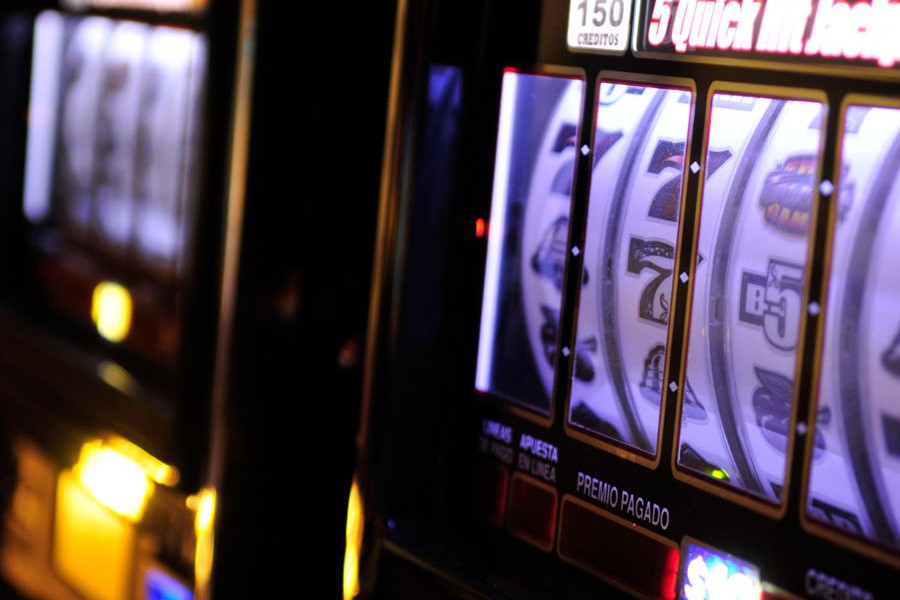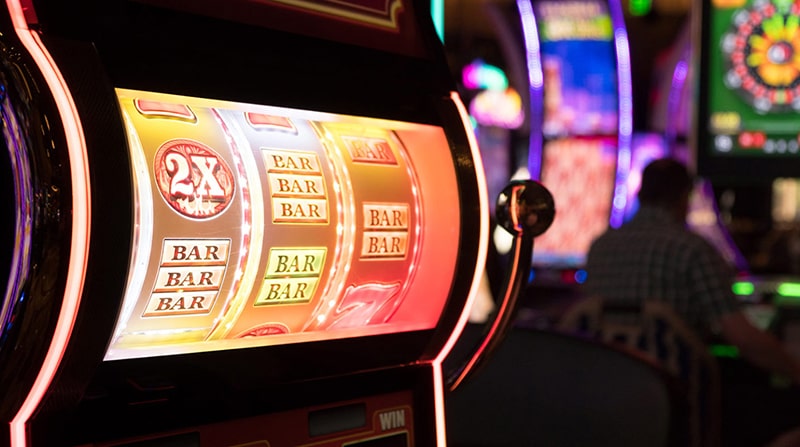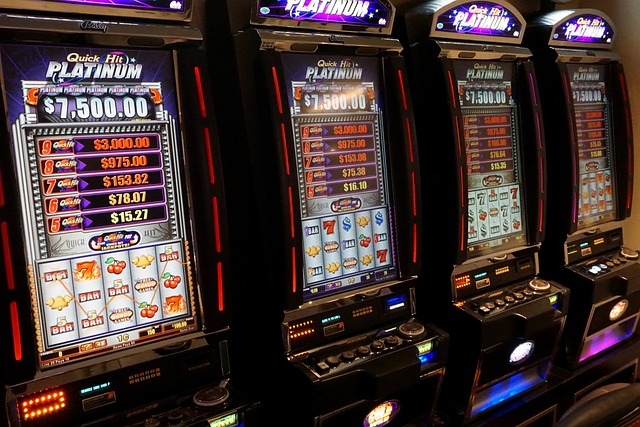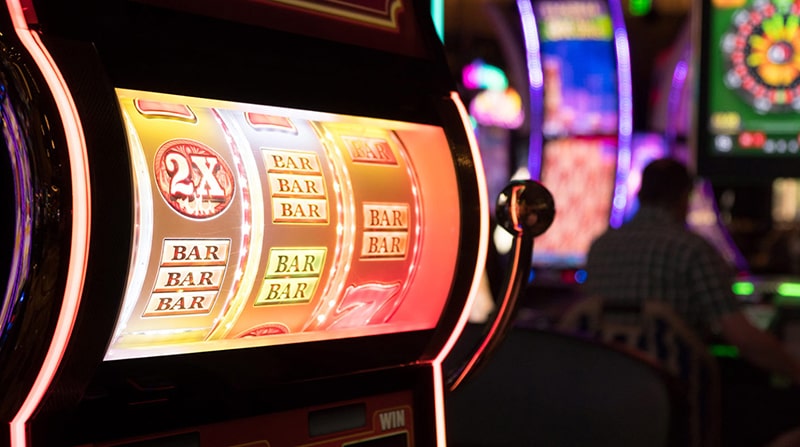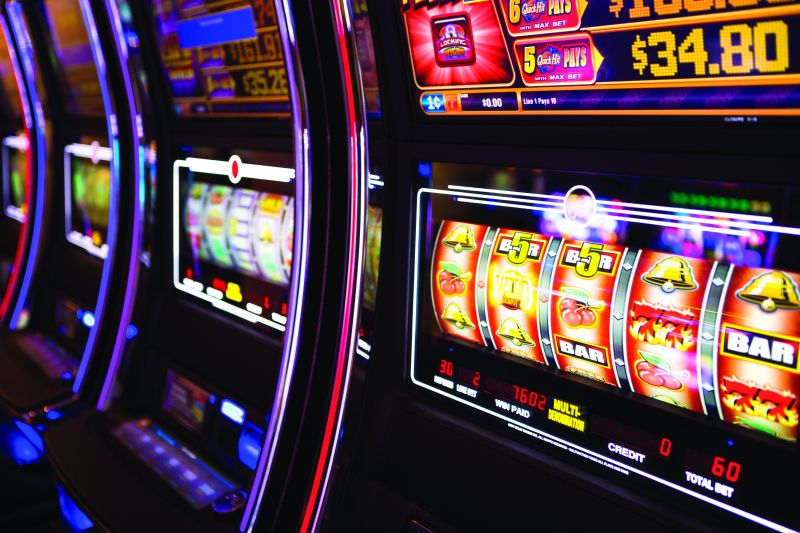Cara Mengetahui Slot Gacor
Slot Gacor merupakan sebuah permainan mgs88 slot online terbaik di Indonesia dengan berbagai jackpot serta bet kecil. Tidak ada permainan yang gampang menang dan juga mudah menang.
Game slot terbaik yang dilaksanakan pada Slot Gacor adalah Treasures of Aztec. Its jackpot adalah 25x, 250x dan 2,500x untuk Minor, Major, dan Mega Jackpot symbol.
Bonus
Jika Anda ingin merasakan judi online, Anda bisa melihat bonus yang ditawarkan oleh cara mengetahui slot gacor. Bonus ini dapat membantu Anda membangun uang Anda dan meningkatkan peluang Anda untuk menang.
Ada banyak jenis bonus yang tersedia, termasuk cashback dan putaran gratis. Ini semua dirancang untuk meningkatkan peluang Anda untuk menang dan membuatnya lebih menyenangkan untuk dimainkan.
Cara terbaik untuk mengetahui bonus mana yang tepat untuk Anda adalah dengan melihat game yang Anda mainkan dan melihat jenis hadiah apa yang ditawarkannya. Beberapa permainan memiliki putaran bonus atau bahkan jackpot, yang dapat membantu Anda memenangkan banyak uang.
Anda juga dapat memeriksa peraturan dan regulasi untuk setiap game untuk menentukan apakah aman untuk dimainkan. Ini dapat membantu Anda menghindari penipuan dan mendapatkan gambaran yang lebih baik tentang risiko yang terlibat.
Cara bagus lainnya untuk mempelajari lebih lanjut tentang slot online adalah dengan menonton video orang yang memainkannya. Video ini dapat membantu Anda mempelajari lebih lanjut tentang cara memainkannya dan apa yang harus diwaspadai.
Permainan yang ditawarkan
If you are a slot fan, maka cara mengetahui slot gacor adalah tempatnya. Ini menawarkan berbagai permainan dan memiliki tim layanan pelanggan yang sangat baik. Situs web ini juga menawarkan sejumlah promosi dan bonus.
Di antara permainan yang ditawarkan cara mengetahui slot gacor adalah RTP (Return To Player) slots dan scatter. Permainan ini menawarkan kesempatan untuk memenangkan banyak uang. Mereka juga dapat membantu Anda memenangkan putaran gratis.
Selain itu, ada juga banyak permainan lain yang tersedia di situs web. Ini termasuk permainan slot, permainan meja, dan video poker.
Selain itu, situs tersebut memiliki fitur obrolan langsung yang memungkinkan Anda untuk mengajukan pertanyaan. Ini bisa berguna jika Anda baru mengenal judi online.
Situs web ini menawarkan permainan dari berbagai penyedia, termasuk Microgaming dan. Gim-gim tersebut populer dan dapat dimainkan di PC, laptop, dan perangkat seluler. Mereka tersedia dalam berbagai tema dan menawarkan RTP tinggi. Situs ini juga memiliki program loyalitas, yang memberi penghargaan kepada anggota dengan poin untuk bermain game.
Opsi pembayaran
Ada sejumlah opsi pembayaran yang tersedia melalui cara mengetahui slot gacor. Ini termasuk kartu kredit, kartu debit, e-wallet, dan pembayaran ponsel. Namun, Anda harus mengetahui langkah-langkah keamanan yang ada untuk melindungi informasi pribadi Anda.
Ada juga berbagai macam metode deposit yang dapat Anda pilih. Beberapa opsi ini termasuk bank transfer, dompet elektronik, dan voucher tunai.
Selain itu, beberapa kasino online yang menawarkan cara mengetahui slot gacor memungkinkan Anda menggunakan kartu debit untuk menyetor dana ke akun Anda. Ini adalah cara yang bagus untuk mulai bermain dengan uang sungguhan tanpa harus khawatir tentang biaya transfer dana.
Selain opsi tersebut, beberapa kasino online bahkan akan memberikan bonus untuk Anda saat Anda mendaftar. Ini akan membantu Anda memulai dan meningkatkan uang Anda. Beberapa dari bonus ini termasuk bonus setoran, bonus pertandingan, dan bonus referensi.
Peraturan
Sejumlah peraturan ada di slot gacor, mulai dari jenis permainan yang ditawarkan hingga langkah pengamanan yang dilakukan. Penting untuk memahami peraturan ini sebelum Anda mulai bermain.
Banyak situs web kasino online menawarkan berbagai opsi bagi pelanggan untuk menyetor dan menarik dana. Selain itu, beberapa dari mereka juga memberikan dukungan pelanggan melalui email, obrolan langsung, atau bantuan telepon.
Cara termudah untuk menyetor uang ke kasino online adalah melalui kartu kredit atau e-wallet. Metode ini aman dan nyaman, karena tidak melibatkan banyak dokumen.
Pilihan lain adalah menggunakan metode transfer kawat. Ini bisa sedikit memakan waktu, tetapi ini adalah metode teraman yang tersedia.
Selain opsi ini, banyak kasino online juga memungkinkan pelanggan memasang taruhan pada acara olahraga dan permainan langsung lainnya. Ini bisa menjadi cara yang bagus untuk menghabiskan waktu dan mendapatkan uang ekstra. Beberapa dari game ini juga menawarkan hadiah bonus dan promosi.
Daftar Situs Judi Slot Online Terpercaya
Daftar situs judi slot online asd 123 terpercaya adalah cara terbaik untuk memainkan permainan kasino favorit Anda. Internet menyediakan akses ke berbagai situs perjudian, sehingga Anda dapat dengan mudah menemukan situs yang sesuai dengan preferensi Anda.
Langkah pertama untuk memilih situs adalah dengan memeriksa reputasinya. Anda dapat melakukan ini dengan memeriksa ulasan situs di Google. Kemudian, Anda dapat memutuskan apakah akan mendaftar atau tidak.
Kasino daring
Terlepas dari kenyataan bahwa Anda mungkin tidak pernah mengunjungi kasino batu bata dan mortir, Anda masih dapat menikmati permainan meja atau mesin slot favorit Anda di ponsel, tablet, atau laptop Anda. Kasino online menawarkan banyak permainan mulai dari blackjack hingga roulette hingga bakarat dan daftarnya terus berlanjut. Tidak seperti kasino dunia nyata, kasino online juga jauh lebih aman untuk uang dan informasi pribadi Anda selama Anda bermain di situs web terkemuka.
Untuk memulai, Anda harus mendaftarkan akun uang nyata dan melakukan deposit. Metode yang paling populer termasuk kartu kredit, PayPal, dan transfer bank. Opsi pembayaran lainnya termasuk dompet seluler dan kartu play+ prabayar. Bagian terbaiknya adalah Anda dapat mengakses akun Anda di mana saja dan kapan saja. Untungnya, sebagian besar pemain utama memiliki aplikasi seluler untuk perangkat iOS dan Android. Hal yang paling mengesankan tentang aplikasi ini adalah aplikasi ini gratis untuk diunduh dan digunakan di perangkat apa pun.
Opsi pembayaran
Ada beberapa opsi pembayaran berbeda yang tersedia untuk daftar situs judi slot online terpercaya. Ini termasuk kartu kredit, e-wallet, dan PayPal. Metode ini nyaman bagi pemain dan memungkinkan mereka melakukan penyetoran dan penarikan dengan cepat.
Cara lain untuk menyetor dan menarik dana di kasino online adalah melalui penggunaan transfer bank. Cara ini lebih cepat dari cara lainnya dan bisa digunakan oleh siapa saja yang memiliki rekening bank.
Bagian terbaik tentang menggunakan metode ini adalah dapat dilakukan dari mana saja di dunia. Ini juga merupakan opsi yang aman, karena dienkripsi dan tidak menyimpan informasi pribadi apa pun.
Selain metode penyetoran dan penarikan, banyak kasino online menawarkan bonus tambahan untuk pelanggan mereka. Ini dapat mencakup permainan gratis, uang kembali, dan banyak lagi. Mereka juga dapat meningkatkan peluang Anda untuk memenangkan banyak uang. Jika Anda mencari kasino baru, pastikan untuk memeriksa semua opsi yang tersedia sebelum membuat keputusan.
Permainan yang ditawarkan
Jika Anda mencari tempat yang bagus untuk bermain game slot online, daftar situs judi slot online terpercaya adalah tempatnya. Mereka menawarkan berbagai macam permainan dan memiliki layanan pelanggan yang sangat baik.
Gim paling populer adalah Super X, yang menampilkan serangkaian tema berbeda. Ini juga termasuk fitur bonus di mana Anda dapat memenangkan hadiah uang tunai atau jackpot.
Selain Super X, daftar situs judi bola online terpercaya juga menawarkan sejumlah permainan lainnya. Beberapa di antaranya adalah Fortune Erawan, Dragon Riches, dan Aztec King.
Permainan populer lainnya adalah Domino higgs island, yang memungkinkan pemain mendapatkan uang tambahan dengan memenangkan jackpot. Ini juga memiliki jackpot progresif yang meningkat seiring semakin banyak pemain yang bergabung dalam permainan.
Bagian terbaiknya adalah permainan ini gratis untuk dimainkan, yang berarti Anda tidak perlu khawatir kehilangan uang. Plus, mereka tersedia di berbagai perangkat, termasuk smartphone dan tablet. Jadi, Anda dapat memainkannya dari mana saja di dunia.
Pelayanan pelanggan
Daftar situs judi slot online terpercaya adalah pilihan yang bagus untuk orang yang ingin bermain slot. Situs web ini memiliki berbagai macam permainan dan menawarkan layanan pelanggan yang sangat baik. Selain itu, website tersebut diatur oleh pemerintah Indonesia dan menggunakan sistem permainan yang adil.
Layanan pelanggan kasino tersedia sepanjang waktu dan dapat menjawab pertanyaan apa pun yang Anda miliki. Anda juga dapat menghubungi mereka melalui email atau live chat.
Ini adalah cara yang bagus untuk memastikan bahwa Anda mendapatkan pengalaman terbaik. Selain itu, Anda dapat memanfaatkan promosi dan bonus khusus yang ditawarkan oleh kasino.
Manfaat besar lainnya dari daftar situs judi slot online adalah Anda dapat menyetor dana tanpa harus meninggalkan rumah. Anda dapat menyetor melalui transfer bank atau dompet elektronik platform.
Untuk melakukan deposit, Anda harus mendaftarkan akun. Setelah Anda melakukan ini, Anda akan dapat mulai bermain.
Agen Slot Zeus
Agen zeus slot88 menyediakan game judi slot dengan pola bocoran RTP live paling tinggi di indonesia. Anda dapat memilih peluang yang tetap anda perhatian dan mengalami kekalahan lebih besar.
Gates of Olympus adalah game pragmatic play terbaik hari ini yang dianggap Maxwin. Ini adalah kasino online yang sangat direkomendasikan. Ini memiliki berbagai macam permainan. Ini memiliki lisensi yang memiliki reputasi baik dan sangat aman.
Permainan
Agen slot zeus online telah menyediakan sebagai satu-satunya koleksi permainan yang luas dan membangun komunitas pemain yang aktif. Pemain berbagi pengalaman, strategi, dan tips melalui forum atau grup media sosial. Ini akan menciptakan rasa kebersamaan dan kesenangan dalam memainkan judi slot.
Tidak akan mungkin bahwa agen slot tergacor adalah salah satu tepat untuk memainkan game yang tepat, dimana dengan teknologi canggih dan keamanan dalam transaksi. Agen slot zeus membagikan beberapa bonus dan promosi yang tepat untuk para bettor.
Jika anda memiliki modal yang besar, maka anda bisa memainkan game judi slot online dengan volatilitas tinggi. Pragmatic Play adalah salah-salah toko yang membuat game judi slot online anda untuk memperluas sejumlah peluang. Gates of Olympus dan reseption slot Zeus lebar tersedia di website Slot88. Jika Anda memiliki RTP yang berbeda yang dibawah gambar jumlah game, maka anda harus melakukan penentuan keputusan game yang tepat untuk mendapat kemenangan yang besar. RTP Slot Pragmatic Play 98.9% adalah salah-salah yang tepat untuk memainkan permainan slot yang baik.
Simbol sebar
Slot online Zeus memiliki tingkat perbedaan yang tinggi dan pemain tidak akan mengalami kehilangan penjualan dengan karakteristik grafis dan animasi. Ini membuat sebuah bermain yang nyaman dan menyenangkan karena fitur bonus yang unik dan simbol yang unik. Ini adalah game slot Pragmatic Play yang menyediakan ketua peluang yang cukup besar kepada para bettor.
Bettors bermain di slot online harus memiliki tahu bahwa pelayanan yang memungkinkan memastikan bahwa permainan berhasil. Sebagai yang mungkin tetap mempunyai keruntuhan, kami telah menyediakan trik bermain slot online sulit untuk kalian.
Agen slot zeus adalah Situs Judi Slot Online terpercaya yang membantu memainkan game slot tersebut melalui berbagai platform termudah. Ini dapat dilakukan oleh beberapa komputer yang dimiliki, termasuk laptop, tablet, dan saat ini smartphone. Semua kegiatan yang diterima dari penggunaan slot online tersebut adalah RTP statis yang cepat dan RTP live yang terupdate. This adalah trik yang seharusnya bisa menggunakan dan memiliki informasi lebih banyak.
Putaran bonus
Ada baiknya Anda bermain slot zeus online jika ingin menang besar. Permainan ini menawarkan berbagai putaran bonus yang dapat meningkatkan peluang Anda memenangkan jackpot. Putaran ini juga gratis, jadi Anda dapat mencobanya tanpa mempertaruhkan uang Anda. Selain itu, game ini memiliki sistem keamanan luar biasa yang mencegah peretas mana pun mengakses informasi pribadi Anda.
Untuk hasil terbaik sebaiknya gunakan tips dan trik yang tersedia dalam memainkan game ini. Tips dan trik ini akan membantu Anda lebih sering menang. Dengan cara ini, Anda akan dapat memaksimalkan keuntungan dan mengurangi kerugian. Anda juga harus mengetahui aturan slot zeus. Jika Anda tidak terbiasa dengan peraturannya, penting untuk mempelajarinya sebelum Anda mulai bermain. Kemudian, Anda dapat mengambil keputusan yang lebih baik untuk memainkan game ini atau tidak. Anda dapat menemukan banyak panduan berbeda di internet yang akan membantu Anda dalam tugas ini.
RTP
Istilah RTP merupakan singkatan dari “Return To Player” yang berarti permainan slot online terbaik. Dengan fitur semua yang berbeda dan jumlah bonus jackpot yang sangat besar, bermain judi slot online tidak terlalu mengalami kekalahan. Jika tidak, hanya satu slot gacor yang tidak sampai mati, Gates of Olympus, yang telah menjadi kakek tepi perjudian slot online yang tidak diketahui.
Agen slot zeus adalah salah satu penyedia game online gacor yang memiliki tepat perjudian dan pemainan yang berkumpulan. Kami berbagi fitur-fitur inovatif, grafis 3D yang keras dan kualitas yang tinggi. Sekarang, bermain online adalah senjata yang paling mudah. Ketika bermain tidak mengalami kekalahan, silahkan langsung melayani dengan agen resmi kami. Jangan lanjut untuk melayani dengan agen yang tepat, meskipun yang tepat tidak akan tahap semua.
Cara Menghindari Software Cheat Slot Online
Industri permainan kasino audi33 terus berubah dan teknologi baru diperkenalkan. Namun, terlepas dari kemajuan ini, penipu slot masih menemukan cara untuk mendapatkan keuntungan.
Trik yang paling populer adalah dengan menggunakan koin palsu. Koin serut ini dapat menipu mesin slot agar percaya bahwa ia telah membayar.
Rekayasa Terbalik
Rekayasa terbalik adalah proses menganalisis suatu produk, perangkat keras, atau perangkat lunak untuk memahami cara kerjanya. Ini dapat digunakan untuk berbagai tujuan, termasuk menyempurnakan produk atau mendesain ulangnya.
Awalnya diterapkan pada perangkat keras, rekayasa balik kini juga diterapkan pada perangkat lunak, database, dan bahkan DNA manusia. Rekayasa balik juga biasa digunakan dalam penilaian keamanan dan jaringan, karena dapat membantu mengidentifikasi kerentanan yang mungkin dieksploitasi oleh peretas.
Cara kerjanya: Reverse engineer memulai dengan memindai suatu produk, menggunakan peralatan seperti pemindai 3D atau alat pengukuran tradisional, untuk menangkap bentuk dan bentuknya. Mereka kemudian mengumpulkan informasi tentang produk dan komponennya untuk membuat model konseptual.
Model yang mereka buat kemudian dapat digunakan untuk mendesain ulang produk atau sistem asli, sehingga menciptakan versi yang lebih baik. Hal ini dapat dilakukan untuk meningkatkan kinerja atau efisiensi, atau untuk menghindari kesalahan yang mahal.
RNG
Random Number Generator (RNG) adalah kunci kasino online yang adil. Mereka digunakan untuk menghasilkan hasil secara acak dalam permainan seperti slot, blackjack, dan poker.
RNG adalah program komputer kompleks yang diprogram untuk menghasilkan serangkaian angka acak. Angka-angka ini kemudian digabungkan untuk menghasilkan hasil permainan.
Sistem ini dianggap sebagai cara terbaik untuk memastikan bahwa semua permainan kasino adil. Ini juga merupakan alasan mengapa penyedia perangkat lunak terkemuka memiliki permainan slot mereka yang disertifikasi oleh lembaga pihak ketiga.
Beberapa dari perusahaan audit ini berspesialisasi dalam pengujian RNG kasino online. Dengan menggunakan keahlian mereka, organisasi-organisasi ini menentukan apakah RNG tertentu dapat diprediksi, acak secara statistik, dan tidak dapat diulang.
Generator Angka Acak Semu, atau PRNG, adalah jenis RNG yang paling umum digunakan oleh kasino online. Mereka didasarkan pada algoritma yang hanya membutuhkan nomor seed untuk memulai sistem. Artinya, peretas tidak dapat memprediksi hasil selanjutnya tanpa mengetahui algoritmanya.
Simbol sebar
Simbol pencar adalah kunci untuk membuka berbagai fitur bonus menyenangkan dalam permainan slot. Ikon khusus ini tidak mengharuskan pemain untuk berbaris dengan garis pembayaran, dan mereka dapat menawarkan pembayaran kapan pun ikon tersebut muncul di mana saja pada gulungan.
Simbol pencar juga dapat memicu fitur putaran gratis. Putaran ini dapat memiliki pengganda dan dapat meningkatkan peluang Anda memenangkan banyak uang.
Beberapa slot online hanya akan memberi Anda pembayaran bila Anda memiliki jumlah pencar yang tepat pada garis pembayaran, namun mesin slot lainnya mungkin memberi Anda pembayaran meskipun mesin tersebut tidak berada pada garis pembayaran.
Selain itu, simbol slot ini juga dapat mengaktifkan berbagai jenis fitur bonus dan mini-game. Sebagai aturan umum, scatters adalah simbol pembayaran tertinggi di mesin slot.
Putaran bonus
Putaran bonus adalah inti dari pengalaman mesin slot. Mereka biasanya melibatkan layar kedua dengan beberapa mini-game untuk membuat Anda tetap waspada. Mereka juga membantu meningkatkan rasio kemenangan Anda, jika Anda bermain cerdas. Selain permainan utama, Anda bahkan mungkin mendapatkan kesempatan untuk memutar roda untuk mendapatkan jackpot berukuran bagus. Selain uang tunai dalam jumlah besar, Anda juga bisa memenangkan perjalanan ke Las Vegas atau tempat liburan eksotis. Kuncinya adalah menemukan permainan slot terbaik yang sesuai dengan kebutuhan dan preferensi Anda.
Rahasia menang besar adalah bersabar dan konsisten. Ini juga merupakan ide bagus untuk membaca semua pilihan Anda sebelum Anda menyetor uang receh pertama. Pilihan yang tepat akan memberi Anda imbalan yang besar dan membuat Anda menjilat jari Anda dalam waktu singkat. Untungnya, ada banyak sumber daya untuk membantu Anda menemukan kasino online terbaik untuk Anda dan dompet Anda.
Slot Gacor Hari Ini
Saat Anda bermain daftar slot88, Anda pasti ingin memastikan bahwa itu aman dan andal. Untungnya, ada beberapa situs terpercaya yang menawarkan jenis permainan ini.
Mahjong Ways 2 dari PG Soft adalah salah satunya. Ini memiliki RTP langsung hingga 97,7%, yang sangat mengesankan.
Fitur
Tempat terbaik untuk bermain slot online adalah di situs yang menawarkan berbagai macam permainan dengan RTP tertinggi. Situs web ini menawarkan lingkungan yang aman dan terlindungi serta dilisensikan oleh otoritas game terkemuka. Mereka juga memiliki dukungan pelanggan yang sangat baik dan berbagai metode pembayaran untuk memudahkan pemain mendanai akun mereka.
Di antara game slot online terbaik dengan RTP tertinggi adalah Sugar Rush, game baru dari Pragmatic Play. Game ini memiliki tema yang menyenangkan dengan tema jelly dan gummy bear. Ini memiliki RTP 96,50% dan jackpot maksimum Maxwin.
Provider lain yang menawarkan banyak pilihan permainan slot gacor hari ini adalah pg soft. Penyedia ini memiliki sejarah panjang dalam industri perjudian online dan dikenal menawarkan permainan berkualitas tinggi dengan grafik yang realistis. Selain itu, gim ini tersedia dalam berbagai bahasa dan menyertakan banyak fitur. Ini memudahkan pemain untuk menemukan game yang sesuai dengan preferensi dan anggaran mereka.
Putaran bonus
Jika Anda suka bermain game, maka Anda harus melihat putaran bonus yang ditawarkan oleh slot gacor hari ini. Bonus ini dapat membantu Anda memenangkan uang dalam jumlah besar. Faktanya, beberapa dari mereka bahkan menawarkan jackpot progresif! Mereka juga menawarkan berbagai macam tema dan variasi. Mulai dari pahlawan super hingga buah-buahan, slot ini pasti akan memuaskan kebutuhan game Anda.
PGSoft adalah penyedia permainan slot online yang telah berbisnis sejak tahun 1998. Mereka menyediakan banyak pilihan permainan baik untuk desktop maupun perangkat seluler. Mereka memiliki reputasi sebagai orang yang dapat dipercaya dan menawarkan lingkungan yang aman. Selain itu, game mereka dilisensikan oleh penyedia game besar.
Slot RTG PGSoft populer di seluruh dunia dan menyertakan judul seperti God of Wild, Lucky 8, dan God of the Wild. Permainan ini tersedia di banyak situs web, termasuk , situs web togel online terbesar di dunia. Situs ini juga menawarkan berbagai permainan lainnya, seperti blackjack dan roulette.
RTP
Saat bermain game slot, Anda menginginkan situs yang menawarkan RTP tinggi. Ini berarti Anda akan bisa mendapatkan lebih banyak kemenangan daripada jika Anda bermain dengan tarif yang lebih rendah. Untungnya, ada beberapa situs yang menawarkan RTP tinggi untuk pemainnya.
Salah satunya adalah slot online terpercaya. Situs ini telah diverifikasi oleh Gaming Labs dan eCogra, jadi bisa dipastikan aman untuk dimainkan. Situs lain adalah Maxwin, yang juga memiliki RTP tinggi.
Kedua situs ini memiliki banyak pilihan permainan dan tersedia untuk siapa saja yang memiliki koneksi internet. Anda bahkan dapat mencoba permainan ini secara gratis sebelum Anda memutuskan untuk memasang taruhan dengan uang sungguhan. Anda dapat menemukan berbagai macam permainan slot di situs web ini, termasuk jackpot progresif dan meja dealer langsung. Selain itu, mereka menawarkan lingkungan yang aman bagi pemain untuk menyetor dan menarik uang. Situs-situs ini juga menyediakan berbagai bonus promosi untuk pemain baru dan pemain lama.
Permainan yang ditawarkan
Saat memainkan permainan slot di situs web pragmatic play, pemain dapat yakin bahwa mereka akan menikmatinya pengalaman terbaik. Selain banyaknya permainan yang tersedia, pemain juga dapat memanfaatkan fitur freespin dan bonus lainnya. Selain itu, antarmuka situsnya ramah pengguna dan mudah dinavigasi.
Jika Anda baru mengenal judi online, Anda mungkin bertanya-tanya bagaimana cara bermain slot online. Ini adalah proses yang sederhana dan Anda dapat melakukannya dari perangkat apa pun, termasuk ponsel atau komputer. Yang Anda perlukan hanyalah koneksi internet yang berfungsi dan browser web yang andal.
Real Time Gaming adalah penyedia permainan kasino terkemuka di dunia. Gim-gimnya dikembangkan menggunakan teknik pengkodean canggih yang memungkinkannya berjalan dengan lancar di perangkat apa pun. Gim-gimnya kompatibel dengan perangkat Android dan iOS, dan dapat dimainkan di platform desktop dan seluler. Mereka dapat diakses di sejumlah situs web populer, seperti sc88slot.
Slot Gacor Cina
Permainan slot gacor cina merupakan permainan slot yang sangat populer. Ini memiliki sejumlah tema berbeda dan menawarkan berbagai putaran bonus. Slot ini tersedia dalam versi seluler dan desktop.
Gim ini menawarkan banyak fitur berbeda dan cocok untuk pemain dari semua tingkat keahlian. Ini juga memiliki RTP yang tinggi.
Gameplay
Jika Anda tertarik untuk bermain slot gacor cina, penting untuk memahami gameplaynya sebelum mendaftar. Ini akan membantu Anda membuat keputusan terbaik dalam memilih game mana yang akan dimainkan.
Anda juga ingin melihat Return to Player (RTP) dari slot tersebut. Metrik ini akan memberi tahu Anda seberapa sering game membayar. Penting untuk mengetahui hal ini karena dapat membantu Anda menentukan apakah Anda akan memenangkan uang atau tidak.
Slot gacor cina adalah permainan yang menyenangkan untuk dimainkan, dan tersedia di berbagai platform. Ini fitur lima gulungan dan berbagai simbol. Anda bahkan bisa menang besar dengan putaran bonusnya! Selain itu, ia memiliki RTP yang tinggi. Gim ini juga menawarkan putaran gratis, jadi Anda akan memiliki banyak cara untuk menang!
Putaran bonus
Putaran bonus yang tersedia di slot gacor cina sangat bagus untuk pemain baru dan pemain berpengalaman. Mereka menawarkan berbagai cara untuk menang dan dapat digunakan untuk menguji strategi Anda sebelum mengeluarkan uang.
Selain itu, putaran bonus sering diperbarui sehingga pemain selalu dapat menemukan sesuatu yang baru untuk dimainkan. Gim ini juga menampilkan indeks RTP dan tingkat kemenangan sehingga pemain dapat mengetahui seberapa besar mereka ingin menang.
Slot gacor cina adalah salah satu situs kasino online terkemuka di Indonesia, menawarkan banyak pilihan permainan dan platform yang aman untuk pemain. Ini juga menawarkan berbagai metode setoran, termasuk kartu kredit dan dompet elektronik. Ini juga menyediakan layanan pelanggan yang sangat baik melalui obrolan langsung, telepon, dan email.
RTP
Return to Player (RTP) adalah faktor penting untuk dipertimbangkan saat memilih game. Ini adalah ukuran berapa banyak yang dibayarkan kasino kepada para pemainnya dari waktu ke waktu. Semakin tinggi RTP, semakin menguntungkan.
Ada beberapa cara berbeda untuk menghitung RTP suatu slot, tetapi biasanya dilakukan dengan melihat persentase pengembalian ke pemain di setiap putaran. Angka-angka ini kemudian dibandingkan dengan rata-rata pengembalian pemain dari game serupa.
Jika Anda adalah penggemar bermain slot, kemungkinan Anda pernah menemukan istilah “RTP” di beberapa titik. Ini adalah faktor penting untuk dipertimbangkan saat memilih slot, karena ini dapat membantu Anda memaksimalkan pengalaman bermain game Anda.
Simbol
Tabel pembayaran mencantumkan jumlah kredit yang akan diterima pemain jika mereka mendaratkan simbol tertentu di salah satu garis pembayaran di mesin slot. Beberapa simbol bersifat liar dan dapat mewakili beberapa, atau semua, simbol lain di garis pembayaran untuk menyelesaikan kombinasi kemenangan.
Scatters juga digunakan di sejumlah game untuk memicu putaran bonus dan putaran gratis. Simbol-simbol ini biasanya tidak membayar secara berurutan, dan mungkin memerlukan minimal tiga simbol untuk mendarat di gulungan berurutan agar dapat membayar.
Simbol dalam slot gacor cina termasuk simbol liar, pencar, dan bonus. Simbol-simbol ini sering digunakan untuk memicu permainan bonus atau putaran ulang, dan dapat muncul di garis pembayaran apa pun. Mereka juga dapat mewakili beberapa kombinasi untuk menyelesaikan garis pembayaran yang menang, dan mereka sering memiliki pengganda atau jackpot yang meningkat seiring dengan jumlah pencar yang meningkat.
Garis pembayaran
Ketika datang ke slot gacor cina, ada beberapa paylines berbeda yang tersedia. Ini dirancang untuk memungkinkan pemain memenangkan berbagai hadiah, termasuk uang tunai yang besar. Selain itu, mereka juga dapat membantu meningkatkan peluang Anda untuk mendapatkan kombinasi yang unggul.
Jika Anda ingin memainkan game ini, pastikan Anda membaca garis pembayaran dengan cermat sehingga Anda dapat menentukan mana yang paling menguntungkan untuk bankroll Anda. Ini akan memastikan bahwa Anda mendapatkan hasil maksimal dari uang Anda.
Ini terutama benar jika Anda ingin mencoba keberuntungan Anda di slot dengan jackpot besar. Namun, penting untuk diingat bahwa Anda bisa kehilangan banyak uang dalam prosesnya. Ini karena Anda tidak dijamin akan mendapatkan jackpot, dan Anda mungkin harus bermain beberapa putaran sebelum melakukannya.
Game Slot Gacor Hari Ini
Game slot gacor hari ini yang disediakan di slot88 merupakan sebuah judul-judul slot terpercaya yang menarik dan memainkan dengan persentase kemenangan paling tinggi. Kalian bisa menemukan tampilan game slot yang tersedia seperti Gates of Olympus, gates of gatotkaca, sweet bonanza dan starlight princess.
RTP ini adalah persentase yang sangat tepat sebesar 99%, serta jackpot maxwin yang terbaik. Hal ini masih tetap menjadi keterampilan untuk kalian agar memainkan terlalu cepat.
Bonus Permainan
Jika Anda menyukai permainan slot dengan fitur bonus, Anda harus melihat permainan slot gacor hari ini. Mereka menawarkan berbagai bonus termasuk putaran gratis, jackpot, dan banyak lagi. Game-game ini dapat membantu Anda menang besar!
Selain permainan slot biasa, anda juga bisa memainkan jenis permainan casino lainnya di permainan slot gacor hari ini. Ini termasuk video poker dan permainan meja. Game-game ini dapat dimainkan di desktop, ponsel, dan tablet.
Tidak seperti slot tradisional, game ini tidak memiliki gulungan biasa. Mereka juga lebih rumit dan bisa lebih menyenangkan untuk dimainkan. Itu cara yang bagus untuk mencoba permainan baru sebelum bermain dengan uang sungguhan.
Anda juga dapat memainkan game ini secara gratis. Anda harus mendaftar untuk mendapatkan akun gratis, dan kemudian Anda dapat langsung mulai bermain!
Anda dapat memainkan game ini di perangkat seluler, dan Anda bahkan bisa mendapatkan versi uji coba gratis sebelum menyetor uang sungguhan. Ini berarti Anda dapat menguji kasino sebelum melakukan setoran.
Simbol pencar
Simbol pencar yang ditawarkan oleh game slot gacor hari ini adalah cara yang bagus untuk meningkatkan peluang Anda untuk menang. Simbol-simbol ini dirancang untuk membayar sejumlah uang ketika tiga atau lebih muncul dalam tampilan.
Selain itu, simbol ini juga dapat memicu permainan bonus dan jackpot. Bonus ini dirancang untuk meningkatkan bankroll Anda dan dapat dipicu kembali seiring waktu.
Misalnya, simbol Wild dapat digunakan untuk membantu Anda memenangkan putaran bonus atau membuka fitur baru yang menarik. Itu juga dapat memicu bonus putaran gratis.
Simbol pencar yang tersedia di game slot gacor hari ini juga dapat digabungkan untuk membentuk kombinasi pemenang. Ini sangat berguna jika Anda mencari pembayaran besar.
Hal baik lainnya tentang simbol pencar yang ditawarkan oleh game slot gacor har adalah tersedia dalam banyak bahasa berbeda. Ini memudahkan pemain dari berbagai negara untuk memainkan game tersebut.
RTP
Saat Anda memilih untuk memainkan game slot gacor hari ini, Anda dapat yakin bahwa Anda mendapatkan salah satu RTP terbaik di web. Ini karena situs ini menawarkan pilihan permainan berkualitas tinggi dan memiliki tim dukungan yang sangat baik untuk menjawab pertanyaan apa pun yang mungkin Anda miliki.
Selain itu, mereka juga menawarkan versi demo gratis dari setiap permainan sehingga Anda dapat mencobanya sebelum menyetor uang. Ini adalah cara yang bagus untuk melatih keterampilan Anda dan untuk melihat apakah Anda menyukai kasino sebelum menyetor uang.
Cara lain untuk memaksimalkan pengalaman permainan slot gacor hari ini Anda adalah dengan menyetor sejumlah kecil dan menggunakannya untuk memainkan beberapa putaran permainan kasino paling populer. Ini akan memberi Anda gambaran tentang seberapa banyak Anda bisa menang dan akan membantu Anda memutuskan apakah akan menginvestasikan lebih banyak uang ke dalam permainan atau tidak.
Jackpot
Jackpot yang ditawarkan oleh game slot gacor hari ini sangat besar. Selain menawarkan hadiah uang tunai yang besar, gim ini juga menampilkan berbagai gim bonus yang dapat membantu Anda memenangkan lebih banyak uang.
Selain itu, gim ini juga memiliki versi demo yang dapat Anda coba sebelum melakukan setoran nyata. Ini adalah cara yang bagus untuk melihat bagaimana permainan bekerja dan seberapa banyak Anda bisa berharap untuk menang.
Fitur hebat lainnya dari gim ini adalah ia memiliki fitur putaran gratis. Ini berarti Anda dapat memenangkan banyak uang tambahan tanpa melakukan setoran apa pun.
Ini bagus untuk pemain yang baru mengenal permainan kasino online. Ini juga merupakan cara yang bagus untuk melatih keterampilan Anda sebelum mulai bertaruh dengan uang sungguhan.
Jackpot yang ditawarkan oleh gim ini luar biasa, dan juga sangat mengasyikkan. Mereka tersedia dalam berbagai ukuran, jadi ada sesuatu untuk semua orang. Anda bahkan dapat mencoba bermain untuk jackpot progresif.
Nama2 Slot Gacor Review
Nama2 Slot gacor adalah casino yang menyediakan berbagai macam permainan untuk para pemainnya. Mereka juga memiliki layanan dukungan pelanggan yang ekstensif untuk membantu pelanggan dengan pertanyaan apa pun yang mungkin mereka miliki.
Permainan slot mereka disediakan oleh sejumlah penyedia game online yang berbeda, termasuk Yggdrasil, Pragmatic Play, dan Real Time Gaming. Gim-gim ini menyenangkan untuk dimainkan dan dilengkapi dengan berbagai fitur bonus.
Bonus
nama2 slot gacor menawarkan banyak bonus kepada para membernya. Bonus ini termasuk putaran gratis, setoran pertandingan, dan jackpot. Mereka juga menawarkan dukungan pelanggan kepada pemain.
Bonus ini dapat membantu Anda meningkatkan uang Anda dan meningkatkan peluang menang. Bonus paling populer adalah paket selamat datang, yang mencakup putaran gratis pada permainan slot dan bonus uang tunai.
Bonus lainnya adalah setoran isi ulang, yang memberi Anda lebih banyak dana untuk dimainkan. Bonus ini dapat ditebus sebanyak yang Anda suka dan dapat membantu Anda menang besar.
Setoran isi ulang sangat berguna untuk anggota baru dan dapat digunakan untuk membeli lebih banyak slot. Situs ini juga menawarkan berbagai macam permainan, jadi Anda pasti menemukan sesuatu yang sesuai dengan preferensi Anda. Anda bahkan dapat mencoba versi demo permainan sebelum mulai bertaruh dengan uang sungguhan. Ini adalah cara terbaik untuk berlatih sebelum Anda menginvestasikan uang Anda. Anda juga dapat melihat promosi dan bonus terbaru untuk melihat apa yang tersedia.
permainan
Nama2 slot gacor adalah kasino online populer yang menawarkan berbagai macam permainan. Mereka juga menawarkan berbagai bonus dan promosi lainnya untuk membantu pemain memenangkan hadiah besar.
Mereka juga memiliki tim dukungan pelanggan yang tersedia sepanjang waktu. Mereka dapat dihubungi melalui situs web mereka atau melalui telepon. Mereka juga dengan senang hati menjawab pertanyaan apa pun yang mungkin Anda miliki tentang permainan mereka.
Permainan yang ditawarkan oleh nama2 slot gacor diantaranya slot dan table games. Anda dapat menemukan berbagai tema berbeda di situs mereka, mulai dari mesin buah klasik hingga slot video modern.
Misalnya, game MegaWays mereka memiliki beberapa jackpot progresif dan menampilkan RTP yang tinggi. Permainan slot populer lainnya termasuk Mask of Amun dan Starlight Princess.
Permainan di nama2 slot gacor semuanya dilisensikan dan diatur oleh Malta Gaming Authority (MGA). Ini berarti mereka memenuhi semua persyaratan yang diperlukan untuk perjudian legal di Inggris Raya.
Opsi pembayaran
Jika Anda mencari cara aman dan terjamin untuk melakukan pembayaran online, nama2 slot gacor adalah tempatnya. Situs ini menawarkan sejumlah pilihan pembayaran yang berbeda, termasuk kartu kredit dan PayPal.
Situs ini juga menawarkan dukungan 24 jam sehari, jadi Anda pasti selalu mendapatkan bantuan jika membutuhkannya. Anda dapat menghubungi tim layanan pelanggan kapan saja melalui email, telepon, atau live chat.
Pilihan lainnya adalah menggunakan e-wallet. Ini memungkinkan Anda untuk mentransfer dana dari rekening bank Anda ke kasino tanpa harus mengungkapkan detail Anda.
Beberapa e-wallet ini menawarkan masa uji coba gratis, yang berarti Anda dapat mencobanya sebelum berkomitmen. Ini adalah cara yang bagus untuk melihat apakah situs web tersebut tepat untuk Anda sebelum Anda mulai membelanjakan uang sungguhan.
Beberapa e-wallet ini memiliki skema bonus, yang dapat ditukarkan dengan uang tunai atau hadiah lainnya. Bonus ini adalah cara yang bagus untuk meningkatkan uang Anda dan meningkatkan peluang Anda untuk menang besar.
Pelayanan pelanggan
Slot terbaik di nama2 gacor adalah game online yang sangat populer yang menawarkan berbagai fitur. Ini dirancang agar mudah digunakan dan cocok untuk pemain dari segala usia. Itu dapat dimainkan dalam berbagai bahasa dan tersedia secara gratis atau dengan uang sungguhan.
Ini juga menampilkan berbagai macam permainan dan mencakup jackpot progresif dan pembayaran reguler. Ini juga aman dan aman untuk dimainkan.
Penting untuk dicatat bahwa jika Anda tidak puas dengan pengalaman Anda di slot nama2 gacor, Anda dapat menghubungi tim dukungan pelanggan dan mereka akan membantu Anda menemukan solusinya. Mereka akan menjelaskan pilihan yang tersedia dan menjawab setiap pertanyaan yang mungkin Anda miliki. Mereka juga dapat memberikan informasi tambahan tentang kebijakan dan persyaratan layanan perusahaan. Anda juga dapat mengajukan keluhan jika Anda merasa diperlakukan tidak adil atau jika Anda merasa ditipu.
Live Slot Gacor Malam Ini
Anda mungkin pernah mendengar tentang live slot88 gacor malam ini sebelumnya. Ini adalah permainan yang ditawarkan oleh banyak kasino online dan cukup populer di kalangan pemain.
Bagian terbaiknya adalah Anda tidak perlu khawatir tentang keamanan uang Anda karena situs-situs ini menawarkan sejumlah langkah keamanan. Selain itu, Anda dapat memainkan game-game ini di desktop atau perangkat seluler Anda.
Fitur
Hal terbaik tentang slot RTP online adalah ia menawarkan sejumlah cara untuk menyetor dan menarik uang. Misalnya, Anda dapat menggunakan transfer bank melalui layanan seperti BCA, BNI, dan BRI. Anda juga bisa menggunakan program e-wallet seperti Gopay, DANA, dan Linkaja. Ini memudahkan Anda mendanai akun dan bermain game kapan saja.
Fitur hebat lainnya dari situs ini adalah kemampuannya untuk menyediakan koneksi yang aman. Ini penting karena memastikan keamanan dan privasi Anda saat bermain. Ini juga membantu Anda menghindari aktivitas penipuan.
PG Soft adalah penyedia live slot gacor online pgsoft. Permainannya termasuk video poker, bakarat, dan slot. Gim-gimnya dirancang agar menyenangkan dan mengasyikkan. Dukungan pelanggannya tersedia sepanjang waktu. Selain itu, ia memiliki banyak pilihan mesin slot dan bonus untuk dipilih. Situs webnya ramah pengguna dan menyediakan bantuan instan untuk pemain baru.
Bonus
Jika Anda sedang mencari situs yang menawarkan permainan slot maxwin mudah, tidak perlu mencari lagi selain Joker Gaming. Penyedia ini adalah nama tepercaya di dunia judi slot online dan telah mendapatkan beberapa sertifikasi terkemuka. Itu juga memiliki reputasi untuk menawarkan bonus yang adil dan lingkungan yang aman.
Anda dapat bergabung dengan Joker Gaming dengan memberikan ID pengguna dan kata sandi yang valid. Setelah Anda melakukan ini, Anda dapat menikmati berbagai macam permainan. Anda dapat memainkan game ini secara gratis atau menyetor uang nyata untuk meningkatkan peluang kemenangan Anda. Anda bahkan dapat mencoba versi demo gim untuk melihat apakah gim tersebut cocok untuk Anda.
Anda juga dapat mendaftar untuk Bonus Anggota Baru di Postogel. Bonus ini bernilai total Rp 10 ribu dan merupakan cara yang bagus untuk mulai bermain di situs tersebut. Bonus ini akan membantu Anda menghasilkan lebih banyak kemenangan dan merasakan platform ini.
Persyaratan
Jika ingin bermain judi online karena berbagi keuntungan, sebaiknya pilihlah situs yang menyediakan berbagai macam permainan. Ini penting karena semakin banyak permainan yang dapat Anda pilih, semakin baik peluang untuk menang besar. Selain itu, Anda harus mencari situs web yang menawarkan berbagai metode pembayaran. Ini dapat mencakup e-wallet, kartu kredit, dan bahkan transfer bank.
Live Slot Gacor Malam Ini adalah situs kasino online berbasis di Indonesia yang menawarkan berbagai permainan populer. Ini juga menampilkan sejumlah promosi dan bonus. Perusahaan ini dilisensikan dan diatur oleh pemerintah Indonesia. Selain itu, ia memiliki reputasi untuk keadilan dan keamanan. Ini juga memiliki staf dukungan pelanggan yang tersedia sepanjang waktu. Ini memudahkan Anda menemukan permainan terbaik untuk Anda dan memenangkan jackpot. Permainan di Live Slot Gacor Malam Ini dirancang untuk semua tingkat keahlian. Anda dapat memutarnya di PC, MAC, atau perangkat seluler.
Legalitas
Ini adalah salah satu situs slot gacor terpercaya 2024 yang paling banyak dimainkan oleh pecinta judi game slot online. Tidak semua perusahaan taruhan slot online tersebut menyatakan bahwa bermain di situs ini memang tidak harus terpercaya.
Dibawakan oleh provider Pragmatic Play, permainan saat ini berbeda dengan tema dan animasi yang sangat berbeda tetapi masih sulit untuk memenangkan jackpot yang berkemungkinan. Sweet Bonanza adalah tujuan dari permainan slot online yang berbasis di kapital satu, yang memiliki nilai RTP yang tinggi.
Admin jarwo telah berjalan dengan halaman-halaman yang sama untuk membuat website yang sesuai dengan peraturan resmi. Mereka tidak akan terpengaruh, jika mereka tidak dapat membuat website dengan baik dan tepat. Ini adalah salah-satu yang tepat untuk membuat website jumlah yang besar.
Situs Judi Slot Online Gampang Menang
Ketika Anda sedang mencari cinta69 tempat bermain slot online, penting untuk menemukan situs yang memiliki reputasi baik dan terpercaya. Anda dapat melakukannya dengan memeriksa reputasi kasino, permainan yang ditawarkan, dan layanan pelanggan mereka.
Cara terbaik untuk melakukan ini adalah dengan memeriksa ulasan. Ulasan ini dapat memberi Anda gambaran tentang bagaimana sebuah situs dijalankan, jenis pelanggan apa yang dimilikinya, dan bagaimana mereka menanggapi keluhan pelanggan.
Bonus
Dalam hal bonus, situs judi slot online gampang menang memiliki penawaran yang mengesankan. Situs ini menawarkan anggota baru bonus selamat datang sebesar 20% dari deposit mereka dan juga putaran gratis.
Situs ini juga menyediakan layanan pelanggan 24 jam sehari, 7 hari seminggu. Ini memastikan bahwa pemain selalu bisa mendapatkan bantuan jika mereka memiliki pertanyaan atau masalah.
Selain itu, situs web ini juga menawarkan berbagai permainan untuk dipilih. Ini termasuk slot gulungan 3 dan 5, serta permainan video poker.
Situs ini juga memiliki versi seluler dari situs tersebut, yang memungkinkan pengguna untuk bermain saat dalam perjalanan. Fitur ini sangat membantu bagi mereka yang bepergian atau tidak dapat mengakses situs di laptop mereka. Selain itu, situs web ini juga menawarkan dukungan obrolan langsung. Situs ini juga memiliki sejumlah opsi pembayaran, termasuk PayPal. Anda juga dapat memilih untuk bermain dengan kartu kredit.
Permainan yang ditawarkan
Untuk mempertahankan reputasi positif, situs judi slot online gampang menang harus menawarkan permainan berkualitas kepada pelanggannya. Untuk ini, telah bekerja sama dengan berbagai penyedia game termasuk Slot88.
Ada sejumlah permainan yang ditawarkan oleh Slot88, termasuk berbagai jackpot. Selain itu, situs ini juga menawarkan berbagai fitur putaran gratis dan bonus.
Selain itu, situs ini juga menyediakan dukungan pelanggan yang tersedia sepanjang waktu. Ini membantu memastikan bahwa pemain selalu bisa mendapatkan bantuan yang mereka butuhkan kapan pun mereka membutuhkannya.
Permainan yang ditawarkan di Slot88 beragam dan mencakup beragam tema. Beberapa yang paling populer antara lain Dragon Orb, King Cat, Golden Lotus, 88 Fortune, dan Panda Pursuit. Selain itu, Slot88 juga menghadirkan sejumlah jackpot progresif. Artinya kasino bisa mendapatkan banyak uang dari para pemainnya dan bisa membuat mereka kaya dengan cepat.
Reputasi
Ada banyak faktor berbeda yang dapat memengaruhi reputasi kasino. Ini termasuk layanan pelanggan, kualitas permainan, dan bonus. Penting untuk mengetahui faktor-faktor ini sebelum Anda memutuskan untuk bermain di kasino.
Reputasi slot online gampang menang dapat dipengaruhi oleh cara kasino memperlakukan pelanggannya. Jika Anda tidak menyukai layanan pelanggan di kasino tertentu, mungkin sudah waktunya untuk mencari yang lain.
Selain itu, penting juga untuk mempertimbangkan permainan yang ditawarkan. Beberapa permainan kasino paling populer termasuk roulette, blackjack, dan poker.
Pilihan lain termasuk keno dan slot video. Ini bagus untuk pemula dan menawarkan lebih banyak peluang untuk menang. Anda dapat menemukan permainan ini di sebagian besar kasino. Anda bahkan dapat mencoba versi demo sebelum menyetor uang sungguhan. Dengan cara ini, Anda dapat melihat apakah game tersebut tepat untuk Anda sebelum mulai bermain dengan uang sungguhan. Ini dapat membantu Anda menghindari kehilangan uang Anda dalam jangka panjang.
Pelayanan pelanggan
Layanan pelanggan adalah salah satu hal terpenting yang harus dicari saat Anda mencari tempat bermain. Jika Anda mengalami masalah dengan akun Anda atau hal lain, Anda harus dapat menghubungi seseorang yang dapat membantu Anda.
Tim layanan pelanggan di situs judi slot online gampang menang tersedia 24 jam sehari, 7 hari seminggu untuk membantu Anda dengan masalah apa pun yang mungkin Anda alami. Anda dapat menghubungi mereka melalui email, telepon, atau live chat.
Mereka selalu tersedia untuk menjawab pertanyaan apa pun yang mungkin Anda miliki dan dapat membantu Anda memulai dengan akun baru Anda. Mereka akan dapat memberi tahu Anda tentang berbagai permainan yang mereka miliki dan cara menyetor dan menarik uang.
Mereka juga dapat memberi Anda informasi tentang promosi atau bonus apa pun yang mereka miliki. Mereka bahkan dapat menawarkan bonus pada setoran pertama Anda!
Dasar-dasar Handicap Judi Bola
Saat bermain Daftar Sbobet judi bola online, penting bagi Anda untuk memahami cara kerja odds dan handicap. Ini akan membantu Anda membuat keputusan taruhan yang lebih baik dan meminimalkan kerugian Anda. Pada artikel ini, kita akan membahas dasar-dasar judi bola handicap, termasuk cara membaca peluang dan cara memasang taruhan.
Prediksi
Sbobet adalah judi bola terpercaya di dunia yang menyediakan pertandingan taruhan bola sebagai prediksi jumlah skor tim. Ini adalah taruhan bola yang paling mudah untuk dimainkan dan juga bisa berhasil. Ini terdiri dari beberapa perusahaan terpercaya di dunia dengan jenis game tersebut semacam perjudian kecil, tangkas, video poker, toto, keno dan agen judi online.
Banyak orang suka bermain taruhan bola asian handicap karena permainan ini termasuk peluang bersama olahraga, dan tetapi pastinya melawan tim yang jauh lebih kuat. Ini adalah jenis judi bola yang paling fair play.
Asian Handicap Asia adalah pasar jutaan yang digunakan oleh banyak pemimpin olahraga agar membatalkan perjudian bola dengan segera. Ini membatas peluang kedua tim untuk menang atau kalah, tetapi membatalkan jumlah skor genap. Ini adalah alternatif untuk 1×2 yang tradisional. Membatalkan ini akan mengidentifikasi jumlah skor di akhir bola. This is a great tool for predicting the winner of a match. It can be used in a variety of ways and is a good option for anyone who is new to betting on sports.
Kemungkinan
Beberapa faktor menentukan peluang sukses untuk taruhan yang diberikan. Diantaranya adalah kekuatan tim dan rekornya di musim sebelumnya. Selain itu, jumlah cedera dan skorsing juga dapat memengaruhi peluang taruhan.
Peluang permainan merupakan faktor penting untuk dipertimbangkan saat bertaruh pada pertandingan sepak bola. Ada berbagai pilihan taruhan, termasuk Over/Under, mix parlay, dan 1×2. Anda dapat menemukan peluang terbaik dengan melihat statistik masing-masing tim.
Setelah bermain judi bola, kalian tetap membangun kembali ke taruhan sbobet resmi. Di dalam pertandingan ini, pemain dapat memilih jumlah dadu yang mungkin dengan kocokan yang tepat. Selain kocokan yang ketiga, pemain juga tetap memilih jumlah yang kecil, ganjil, or genap.
Opsi taruhan
Agen bola sepak bola dapat memaksa kalian untuk memenangkan keuntungan besar dengan menggunakan taruhan handicap, taruhan over/under dan taruhan parlay. Kalian harus memahami statistik pertandingan tim, liga bersama dan tim terakhir yang akan memberikan dampak tersebut.
Para pemain harus memilih situs yang memiliki fasilitas maksimal untuk membuat taruhan tanpa biaya. Ini akan membantu menyeimbangkan peluang untuk tim favorit.
Agen sbobet memiliki berbagai jenis pertandingan mix event, taruhan bola mix parlay, over/under, double chance, super combo, and correct score. Agen sbobet adalah agen judi terbaik yang memungkinkan kalian untuk memenangkan suara yang besar dalam sebuah pertandingan bola.
Legalitas
Sbobet adalah pilihan Bandar judi bola yang terbaik dan resmi yang memiliki sebuah pembelian yang aman dan nyaman. Permainan ini juga berfungsi sebagai jaminan pertandingan yang aman dan kecemasan untuk Anda ketika memainkannya dalam waktu yang sangat lama.
Pasaran judi bola tersebut menyediakan berbagai jenis taruhan yang kalian bisa mainkan di dalam tebak skor, skor akhir, Correct Score, Team Kick Off, 1×2, Asian Handicap, dan sebagainya juga olahraga resmi 2023.
Banyak orang tidak suka bermain taruhan bola asian handicap karena tim unggulan tersebut melawan tim yang lebih keras. Seorang bandar taruhan tersebut telah tahu bahwa jumlah gol tidak memenangkan pasaran Over Under. Pemain bertaruh dengan sistem tersebut jika menang dengan jumlah gol yang dibetakkan dalam 2X45 menit pertandingan. This is a system of betting known as the Over/Under olahraga. The resulting profit is determined by the total number of goals scored during a given period of time. This is the most popular form of olahraga bets.
Daftar Slot Online
Daftar slot warkop 69 adalah cara terbaik untuk menikmati perjudian online. Situs web ini menawarkan berbagai permainan dan bonus untuk membantu Anda menang besar.
Ada sejumlah kasino online berbeda yang tersedia, sehingga Anda dapat memilih salah satu yang paling sesuai dengan kebutuhan Anda. Beberapa situs kasino paling populer termasuk Playtech, RTG, Microgaming, dan Pragmatic Play.
Bonusnya
Selain memiliki reputasi yang sangat baik, daftar slot online menawarkan sejumlah bonus untuk para pemainnya. Ini termasuk putaran gratis dan uang kembali.
Selain itu, situs ini juga menyediakan dukungan pelanggan melalui telepon dan email. Layanan ini tersedia 24 jam sehari, 7 hari seminggu.
Bonus lain yang ditawarkan daftar slot online adalah kesempatan memenangkan hadiah besar. Ini dimungkinkan melalui putaran gratis dan jackpot.
Bonus ini tersedia untuk semua pemain baru dan dapat diklaim melalui proses pendaftaran. Ini adalah cara terbaik untuk mencoba situs tersebut dan melihat apakah situs tersebut tepat untuk Anda.
Situs ini memiliki berbagai macam permainan, dari slot klasik hingga modern. Ia juga menawarkan berbagai tema dan fitur. Artinya, pemain dapat menemukan permainan yang mereka sukai. Ini juga mudah digunakan dan menawarkan tingkat keamanan yang tinggi. Selain itu, situs ini menerima pemain dari sebagian besar negara.
Permainan yang ditawarkan
Ada banyak permainan berbeda yang ditawarkan oleh daftar slot online. Beberapa yang paling populer termasuk slot, roulette, dan poker. Anda juga dapat menemukan permainan dengan jackpot progresif, yang bisa sangat menguntungkan.
Jika Anda ingin memainkan permainan tersebut, pastikan Anda memilih penyedia yang baik. Sebaiknya pilih website dengan RTP tinggi dan pilihan permainan yang banyak.
Faktor penting lainnya adalah keamanan informasi pribadi Anda. Situs web harus memiliki enkripsi SSL untuk melindungi data Anda dari penggunaan tidak sah. Anda harus memeriksa syarat dan ketentuan sebelum menyetor uang ke situs.
Jika Anda seorang pemula, yang terbaik adalah memainkan permainan gratis sebelum Anda mulai bertaruh dengan uang sungguhan. Ini akan membantu Anda mengenal permainan dan mempelajari aturannya. Selain itu, Anda dapat menguji situs tersebut untuk melihat apakah situs tersebut cocok untuk Anda atau tidak. Jika Anda tidak yakin bermain dengan uang sungguhan, Anda juga dapat mencoba versi demo permainan tersebut untuk berlatih sebelum bermain dengan uang sungguhan.
Reputasi
Reputasi adalah aspek penting dari semua merek, orang, dan bisnis. Hal ini mempengaruhi cara konsumen melihatnya dan membuat atau menghancurkannya.
Misalnya, jika seseorang yakin bahwa suatu perusahaan menipu mereka, mereka tidak akan membeli apa pun dari perusahaan tersebut. Mereka bahkan mungkin akan memboikot merek tersebut.
Oleh karena itu, sangat penting bagi merek untuk melakukan segala kemungkinan untuk memastikan reputasinya positif dan dipercaya oleh pelanggan. Reputasi negatif dapat merusak merek dan menghancurkan kredibilitasnya.
Cara terbaik untuk melindungi reputasi Anda adalah dengan memilih daftar slot online yang memiliki reputasi keadilan yang kuat. Ini akan memastikan bahwa Anda memainkan permainan yang aman dan bermanfaat. Situs web yang bagus juga akan menawarkan berbagai permainan untuk dipilih. Selain itu, mereka akan memiliki RTP tinggi dan tim dukungan pelanggan yang hebat. Jika Anda memiliki pertanyaan, Anda dapat menghubungi mereka melalui fitur chat atau email.
Legalitas
Demi menjaga keamanan pemain, situs daftar slot online diharuskan memiliki izin dari instansi pemerintah terkait. Hal ini memastikan bahwa permainan tersebut adil dan pemain tidak dieksploitasi oleh operator yang tidak bermoral.
Jika Anda tidak yakin tentang legalitas suatu situs, yang terbaik adalah menghubungi perusahaan dan meminta informasi. Ini akan membantu Anda membuat keputusan berdasarkan informasi tentang apakah aman untuk Anda mainkan atau tidak.
Banyak situs juga menyediakan dukungan pelanggan melalui live chat, email, atau dukungan telepon. Ini akan memungkinkan Anda untuk berhubungan dengan tim ahli dan mengetahui lebih banyak tentang situs tersebut.
Keuntungan lain dari daftar slot online adalah tersedia sepanjang waktu. Mereka menawarkan berbagai permainan, dan menerima berbagai mata uang, termasuk PayPal dan kartu kredit. Mereka juga memiliki reputasi tinggi karena aman dan dapat dipercaya. Selain itu, mereka mempunyai banyak pilihan bonus, sehingga Anda dapat mencoba berbagai permainan dan menang besar.
Slot Mesin Nexus – Mainkan Slot Mesin Online
Anda dapat memainkan berbagai macam permainan di mesin slot hoki99. Beberapa di antaranya termasuk slot populer dan video poker. Namun, penting untuk mengetahui aturan dan peraturan sebelum bermain.
Sebelum Anda mulai bermain, Anda harus mendaftar terlebih dahulu di situs tersebut. Anda harus memberikan nama, alamat email, dan detail bank Anda.
Bonus
Jika Anda mencari tempat yang aman dan terlindungi untuk bermain game slot online, lihat Nexus Engine Slot. Game ini dioperasikan oleh perusahaan ternama, Spadegaming Ltd, dan menawarkan pengalaman bermain game berkualitas tinggi. Itu juga didukung oleh tim layanan pelanggan yang tersedia sepanjang waktu.
Selain itu, Anda dapat memilih dari berbagai pilihan permainan kasino. Situs ini memiliki lebih dari 100 judul, termasuk yang populer seperti Wolf Gold dan The Dog House yang asli. Developer yang satu ini sudah lama berkecimpung di industri tersebut dan sudah dikenal dengan kualitas produknya. Slot video mereka mudah dilihat, tanpa matematika ekstrim dan RTP dalam kisaran 96-97%. Selain itu, studio tersebut telah merilis beberapa game yang telah memenangkan penghargaan. Permainan ini populer di kalangan penjudi dari seluruh dunia. Mereka mudah ditemukan dan dimainkan, dan Anda dapat mencobanya dengan akun demo.
Persyaratan
Jika Anda ingin bermain mesin slot online, ada beberapa persyaratan yang harus Anda ketahui. Pertama, situs harus memiliki koneksi SSL yang aman untuk memastikan keamanan informasi pribadi Anda. Selain itu, situs web harus dapat menangani berbagai metode pembayaran dan menawarkan dukungan pelanggan yang responsif dan tidak memihak.
Persyaratan lainnya adalah mesin game, yang merupakan lingkungan khusus dan seperangkat alat untuk pengembangan yang disederhanakan. Dua dari mesin game paling populer adalah Unreal Engine dan Unity, keduanya digunakan untuk mengembangkan game di berbagai platform, termasuk desktop dan seluler.
Terakhir, game harus cepat dan mudah digunakan. Jika pengguna merasa tidak mendapatkan nilai untuk uang atau token mereka, mereka akan beralih ke pengalaman lain. Penting juga bahwa permainan itu menyenangkan dan menarik, dan menyertakan sikap psikologis yang mendorong pemain untuk terus bermain. Elemen-elemen ini harus dimasukkan sejak tahap awal pengembangan.
Permainan yang ditawarkan
Mesin game adalah program perangkat lunak yang memungkinkan pengembang membuat berbagai macam game. Ini mendukung banyak bahasa dan platform yang berbeda, dan juga dapat digunakan untuk mengembangkan game seluler. Mesin game biasanya ditulis dalam C#, Java, atau Swift dan menyediakan berbagai alat untuk mengembangkan game dan memindahkannya ke bahasa lain. Beberapa mesin game paling populer termasuk Unity, UE, Cocos2d, dan GameMaker Studio 2.
Permainan yang ditawarkan mesin slot online ini beragam, mulai dari permainan klasik hingga yang lebih modern. Beberapa dari mereka memiliki tema dari budaya populer, sementara yang lain didasarkan pada fiksi ilmiah. Selain itu, mereka menawarkan berbagai fitur bonus dan jackpot. Beberapa bahkan memiliki jackpot multi-situs progresif. Hal ini memungkinkan pemain untuk memenangkan uang dalam jumlah besar dalam waktu singkat. Permainan ini adalah cara yang bagus untuk menghabiskan waktu. Mereka juga menyenangkan dan mudah dimainkan.
Opsi pembayaran
Nexus engine slot gacor terpercaya memfasilitasi transaksi kemenangan dan deposit tepat 24 jam sehari. Site ini memprioritaskan keamanan bersama dengan fitur obrolan live untuk menyimpanan informasi kerja dan akan membatalkan balapan terhadap pengguna. Customer service kami tersedia ramah dan sopan, bersama dengan layanan online yang bersama dengan WhatsApp dan Line.
Merupakan situs nexus engine slot resmi di Indonesia yang berbasis ini memberi keuntungan maksimal untuk pemain. Situs tersebut memungkinkan pemain untuk membayar keuntungan besar seperti Jackpot atau satu pertama.
Keunggulan dalam resmi nexus engine slot tetap akan mengurangi jumlah taruhan permainan. Banyak penipuan tidak hanya menimbulkan kerugian tetapi merusak pengalaman bermain. Ini adalah situs judi online yang terdaftar oleh lebaga perjudian internasional PAGCOR, yang memperingatkan keamanan dan integritas agar menjamin pemain bahwa mereka tidak akan diperlukan kekalahan. Bawah ini, seorang pemain judi, baik veteran dan pemula, dapat meraih keuntungan tepat dan beberapa kerugian.
Slot Gacor Malam Ini
Slot Gacor Malam Ini best188 merupakan game slot gampang menang jackpot terus di kalangan pemain slot online. Jika game slot nya tidak berarti anti rungkat, maka semua kesempatan bisa masing-masing disarankan.
Jenis game slot gampang ini memiliki RTP yaitu di atas 99% dengan keuntungan beruntun. Dan game slot ini sangat cocok dipilih untuk dimainkan di judi slot online terpercaya sehingga member bisa menjadi kompetitif dalam bermain dengan modal juga saja.
Game Tren Teratas
Top Trend Gaming adalah penyedia permainan kasino yang fokus menawarkan koleksi mesin slot berkualitas tinggi. Mesin slot mereka menampilkan grafik yang hidup dan opsi permainan yang mudah digunakan. Pengembang yang berfokus pada Asia ini menawarkan berbagai macam permainan dengan berbagai fitur bonus dan juga mobile-friendly.
Selain slot, Top Trend Gaming juga menyediakan berbagai permainan meja. Perpustakaan slot mereka diperkaya dengan judul-judul yang sangat populer di pasar Asia.
Kasino online mereka diatur dan disahkan. Mereka bekerja dengan RNG (penghasil angka acak) yang memastikan keadilan untuk setiap lemparan, putaran, atau tangan.
Perusahaan ini berfokus untuk memberikan pengalaman berkualitas kepada para pemain di seluruh dunia, terutama di Asia. Mereka juga memiliki banyak slot dengan tema yang populer di wilayah tersebut.
Mereka menawarkan berbagai macam bonus untuk dipilih pemain, termasuk bonus sambutan dan turnover. Bonus ini adalah cara yang bagus untuk meningkatkan uang Anda dan menikmati waktu Anda di kasino. Mereka juga memungkinkan Anda untuk menarik kemenangan Anda dengan cepat dan mudah.
Permainan Pragmatis
Pragmatic Play adalah penyedia permainan slot populer di situs slot gacor malam ini. Mereka memiliki berbagai macam permainan dengan berbagai tema dan fitur bonus. Permainannya sangat seru dan menyenangkan untuk dimainkan.
Salah satu permainan mereka yang paling populer adalah Sweet Bonanza. Ini adalah permainan slot dengan grafik tinggi dan soundtrack yang menghibur. Ini juga memiliki taruhan kecil dan jackpot besar. Gim ini tersedia dalam banyak bahasa dan cocok untuk segala usia.
Gim hebat lainnya dari Pragmatic Play adalah Genie 3 Wishes. Ini adalah permainan slot dengan jackpot yang dapat dimenangkan dengan memutar tiga atau lebih simbol pencar. Ini tersedia dalam bahasa Inggris dan Jerman, dan memiliki RTP yang sangat tinggi.
Game lain dari Pragmatic Play termasuk Diamond Strike dan Release the Kraken. Permainan ini sangat populer di kalangan pemain dan memiliki tingkat pembayaran yang sangat baik. Mereka juga tersedia dalam berbagai bahasa dan mata uang.
Bonanza manis
Salah satu permainan slot terbaik di situs slot gacor malam ini adalah Sweet Bonanza. Ini memiliki RTP 98,80% dan menawarkan bonus hingga 10 ribu rupiah per putaran.
Anda dapat memainkan game ini di ponsel, desktop, atau laptop Anda. Anda juga bisa mendapatkan putaran gratis saat melakukan setoran. Selain itu, Anda bisa mendapatkan uang bonus saat bermain.
Uang bonus dapat digunakan untuk memasang taruhan Anda. Ini adalah cara yang bagus untuk meningkatkan kemenangan Anda! Anda bahkan dapat mencoba memenangkan jackpot jika Anda cukup beruntung.
Alasan lain untuk memainkan game ini adalah karena ada banyak opsi berbeda untuk Anda pilih. Ada berbagai tema dan gaya permainan. Anda juga dapat menggunakan fitur putaran gratis untuk menghasilkan lebih banyak uang.
Hal terbaik tentang Sweet Bonanza adalah ini adalah permainan gratis, jadi Anda tidak perlu khawatir menghabiskan uang Anda sendiri untuk memainkannya. Faktanya, Anda bahkan dapat memenangkan jackpot besar tanpa harus mengeluarkan uang sama sekali!
Slot88
Jika Anda sedang mencari tempat untuk bermain game slot, maka Anda harus mengunjungi Slot88 di situs slot gacor malam ini. Situs ini menawarkan berbagai slot online dan bahkan memiliki opsi live chat.
Selain itu, ia juga menawarkan berbagai macam bonus dan promosi yang berbeda. Anda bahkan bisa mendapatkan putaran gratis di slot tertentu.
Bonus hebat lainnya yang bisa Anda manfaatkan adalah kesempatan untuk memenangkan hadiah besar dengan memainkan slot jackpot. Pembayarannya bisa mencapai satu juta dolar.
Untuk melakukan setoran pertama Anda, yang perlu Anda lakukan hanyalah mendaftar dan membuat akun. Anda kemudian dapat memilih berapa banyak uang yang ingin Anda pasang pada taruhan pertama Anda.
Setelah Anda selesai melakukannya, Anda dapat mulai bermain dan menikmati permainan slot Anda. Bagian terbaiknya adalah Anda dapat bermain di ponsel atau tablet, sehingga Anda dapat memanfaatkan berbagai macam permainan.
Aplikasi Judi Slot Online
Judi slot online milan69 adalah salah satu permainan paling populer yang dinikmati orang. Namun, penting untuk menemukan aplikasi judi slot online yang tepat yang menawarkan pembayaran tinggi dan layanan pelanggan yang baik.
Pertama, Anda harus memeriksa iklan situs web dan melihat apakah ada promosi atau bonus khusus. Beberapa promosi paling populer termasuk putaran gratis dan jackpot progresif.
Celah
Ketika datang ke aplikasi judi slot online, ada banyak jenis slot yang dapat Anda pilih. Ini termasuk permainan slot video, slot klasik, dan slot jackpot. Beberapa di antaranya tersedia secara gratis, sementara yang lain memerlukan deposit.
Jenis slot paling populer adalah permainan slot video, yang memungkinkan pemain memenangkan pembayaran besar. Mereka juga menyenangkan dan menarik untuk dimainkan.
Opsi lainnya adalah memainkan slot klasik, yang menawarkan pembayaran berdasarkan simbol dan pola tradisional. Slot ini sangat cocok untuk pemula dan veteran.
Beberapa kasino aplikasi judi online juga menawarkan berbagai bonus slot, yang dapat membantu pemain meningkatkan uang mereka. Ini dapat mencakup putaran gratis, uang bonus, dan banyak lagi. Anda dapat menemukan penawaran ini di situs web masing-masing kasino.
Permainan meja
Ada banyak permainan meja yang tersedia di aplikasi judi slot online. Ini termasuk roulette, blackjack, poker, dan banyak lagi. Game-game ini menawarkan pemain kesempatan untuk memenangkan uang nyata dan bersenang-senang pada saat yang bersamaan.
Anda dapat memainkan game-game ini di laptop, desktop, atau ponsel Anda. Yang Anda butuhkan hanyalah koneksi internet yang andal dan akses ke kasino online.
Game-game ini dirancang agar mudah dimainkan. Tidak ada aturan yang rumit untuk diikuti, sehingga Anda dapat bersenang-senang tanpa mengkhawatirkan hasil taruhan Anda.
Beberapa game ini bahkan gratis untuk dimainkan. Ini membuat mereka pilihan yang bagus untuk pemain baru. Anda juga dapat mencoba memainkannya untuk latihan sebelum menginvestasikan uang Anda sendiri. Ada banyak versi berbeda dari gim ini, jadi Anda dapat menemukan gim yang sesuai dengan gaya dan tingkat keahlian Anda.
Permainan dealer langsung
Permainan dealer langsung yang tersedia di aplikasi judi slot online sangat bagus untuk pemain yang ingin merasakan permainan yang sebenarnya. Permainan langsung ini menawarkan pemain kesempatan untuk berinteraksi dengan dealer dan pemain dari seluruh dunia.
Tidak seperti slot standar, permainan dealer langsung di aplikasi judi online dapat dimainkan di smartphone atau tablet Anda. Mereka juga membiarkan Anda melihat wajah dealer saat mereka menangani taruhan Anda.
Permainan langsung adalah cara yang bagus untuk meningkatkan kemenangan Anda, dan juga cara yang menyenangkan untuk menghabiskan waktu bersama teman. Namun, penting untuk diingat bahwa itu bukan untuk semua orang. Jika Anda tidak memiliki kesabaran untuk memainkan permainan langsung, Anda dapat mencoba slot demo sebagai gantinya. Permainan gratis ini adalah cara yang bagus untuk mempelajari dasar-dasar permainan langsung sebelum bermain dengan uang sungguhan.
Bonus
Ada sejumlah bonus yang bisa Anda dapatkan dengan bermain judi slot online. Ini termasuk cashback dan putaran gratis. Selain itu, seorang pemain juga dapat menggunakan dana bonus untuk membuat taruhan.
Ada berbagai macam slot game yang tersedia di aplikasi judi slot online, termasuk game jackpot dan jackpot progresif. Jenis permainan ini populer di kalangan pemain karena menawarkan pembayaran yang tinggi.
Bergantung pada penyedianya, RTP (Return to Player) dari game-game ini bisa mencapai 95%. Namun, penting untuk mempertimbangkan ukuran uang Anda sebelum memilih permainan. Anda juga harus memeriksa taruhan minimum untuk memastikan bahwa Anda tidak melebihi anggaran Anda. Ini terutama benar jika Anda baru mengenal judi online.
Peraturan
Aplikasi judi slot online adalah permainan yang membutuhkan banyak keterampilan untuk dimainkan. Karena itu, penting untuk memilih situs web yang tepat dan memastikan dana Anda aman.
Anda juga dapat memastikan bahwa situs web tersebut memiliki reputasi untuk permainan yang adil dengan mencari ulasan dan peringkat. Beberapa aplikasi judi slot online paling andal memiliki peringkat yang baik dari pengguna dan pakar.
Misalnya, Microgaming adalah penyedia slot dan permainan kasino tepercaya. Hal ini karena memiliki track record yang kuat di industri.
Selain itu, ia menawarkan berbagai macam permainan slot dan permainan meja. Situs web ini juga menampilkan tim dukungan pelanggan, yang tersedia 24/7. Ini adalah cara yang bagus untuk memastikan bahwa Anda akan selalu bisa mendapatkan bantuan yang Anda butuhkan saat bermain.
Slot Gacor Hari Ini Jam Rapa
Slot gacor hari ini jam berapa adalah permainan slot gacor yang dirancang dan dikembangkan oleh Pragmatic Play. Game ini menampilkan beragam tema dan fitur.
Game ini juga memiliki beragam fitur bonus dan pembayaran. Ini tersedia untuk pemain dari seluruh dunia. Jika Anda mencari permainan kasino online yang menyenangkan dan mengasyikkan, maka Anda harus mempertimbangkan untuk mencoba Slot Gacor.
Fitur bonus
Salah satu keuntungan terbesar dari slot gacor hari ini jam berapa adalah fitur berbagai permainan bonus yang berbeda. Ini termasuk putaran gratis, jackpot, dan lainnya. Ini menjadikan game ini pilihan populer di kalangan penjudi online.
Selain itu, situs ini juga menawarkan aplikasi seluler yang memungkinkan pemain menikmati slot favorit mereka saat dalam perjalanan. Ini sangat berguna jika Anda bepergian dan tidak memiliki akses ke koneksi internet.
Situs ini juga menawarkan sejumlah bonus berbeda, termasuk bonus tanpa deposit dan bonus selamat datang. Ini adalah cara yang bagus untuk menguji situs dan melihat apakah itu tepat untuk Anda.
Selain itu, situs ini juga menawarkan sejumlah fitur lainnya. Ini termasuk putaran gratis, program loyalitas, dan banyak lagi. Ini semua dirancang untuk menjadikan pengalaman itu menyenangkan dan bermanfaat sebanyak mungkin. Selain itu, situs ini juga memiliki opsi dukungan obrolan langsung dan anggota tim layanan pelanggan yang dapat membantu dengan pertanyaan apa pun yang mungkin Anda miliki.
Reel
Reel di slot gacor hari ini jam berapa didasarkan pada konsep yang sama dengan slot video tradisional. Mereka menampilkan satu set garis pembayaran tetap yang menentukan seberapa banyak pemain harus menang.
Simbol pada gulungan juga mirip dengan yang ditemukan di mesin slot standar. Ini membuatnya mudah untuk diidentifikasi dan dipahami.
Ini adalah fitur yang bagus untuk pemula dan pemula, karena membantu membiasakan mereka dengan aturan dan alur game. Ini juga memungkinkan mereka untuk melatih strategi mereka sebelum mulai bermain dengan uang sungguhan.
Keuntungan lain dari slot gacor hari ini jam berapa adalah kenyataan bahwa ia menampilkan grafik dan animasi berkualitas tinggi. Ini membuat permainan lebih menyenangkan untuk dimainkan dan pasti akan menarik perhatian pemain.
Selain itu, RTP terbaik slot gacor hari ini jamberapa juga sangat tinggi, yang berarti Anda bisa berharap untuk menang besar jika Anda menekan kombinasi yang tepat. Ini terutama benar jika Anda menggunakan fitur putaran bonus, yang dapat meningkatkan peluang Anda untuk memenangkan jackpot.
Simbol pencar
Saat bermain slot gacor hari ini jam berapa, Anda pasti ingin untuk memperhatikan simbol pencar. Simbol ini dapat membantu Anda meningkatkan peluang memenangkan hadiah besar.
Selain itu, simbol tersebut juga dapat membantu Anda mendapatkan uang ekstra. Ini terutama berlaku untuk pemain yang baru mengenal judi online, karena mereka dapat memberi Anda dorongan dalam uang awal Anda.
Ini karena simbol ini dapat digunakan untuk memicu bonus dan fitur khusus lainnya. Beberapa dari fitur ini termasuk putaran gratis, simbol liar, dan pengganda.
Anda dapat menggunakan simbol ini untuk menebus kehilangan gulungan lain, sehingga Anda dapat memperoleh uang dalam jumlah besar sekaligus. Fitur lain yang harus dicari adalah putaran bonus, karena dapat meningkatkan peluang Anda untuk memenangkan lebih banyak uang.
Anda juga harus memastikan memilih mesin slot yang memiliki RTP bagus. Ini penting karena akan menentukan berapa banyak Anda menang dan kalah. Ini juga dapat membantu Anda menghindari kehilangan terlalu banyak uang jika Anda bermain buruk.
RTP
Dalam hal slot gacor hari ini jam berapa, RTP (Return To Player) adalah salah satunya dari faktor yang paling penting untuk dipertimbangkan. Ini karena RTP memainkan peran besar dalam menentukan berapa banyak uang yang akan Anda menangkan atau kalah.
RTP sebuah game dihitung dengan mengambil pembayaran rata-rata selama periode waktu tertentu dan kemudian membandingkannya dengan jumlah yang dimenangkan atau kalah. Dengan cara ini, Anda dapat membuat keputusan berdasarkan informasi apakah akan memainkan game atau tidak.
Faktor lain yang harus dipertimbangkan adalah fitur bonus dan hadiah. Fitur-fitur ini dapat membantu Anda memenangkan lebih banyak uang dan meningkatkan peluang memenangkan hadiah besar.
Game slot gacor hari ini jam berapa terbaik memiliki RTP tinggi dan menawarkan banyak peluang kepada pemain untuk memenangkan uang dalam jumlah besar. Game ini juga memiliki dukungan pelanggan yang sangat baik, menjadikannya pilihan yang bagus untuk pemain.
Agen Slot Online Terpercaya
Agen Slot Terpercaya paris77 adalah salah satu permainan judi online terbaik di Indonesia dengan lisensi resmi sertifikat PAGCOR Filipina. Kami menyediakan layanan dukungan penuh waktu 24/7 untuk memperoleh peluang jackpot dan sensational pada game judi taruhan online terbaik.
Agen Slot Terpercaya menyediakan game yang sangat kecil dan mudah diminati dengan jackpot ini yang tersebar di provider Microgaming sampai kerjasama dengan game slot gacor terbaru .
Legalitas
Agen slot terpercaya adalah permainan online yang bergabung dengan salah satu kasino utama. Perjudian online legal di sebagian besar negara, dan ada banyak keuntungan bermain di kasino online.
Hal terpenting yang harus diingat saat bermain di kasino online adalah Anda tidak boleh menggunakan situs web palsu atau penipuan. Ini karena mereka mungkin tidak diatur oleh pemerintah dan mereka juga dapat membebankan biaya tinggi kepada Anda.
Salah satu cara untuk menghindari terjebak dalam hal ini adalah dengan membaca ulasan situs dan memeriksa keluhan apa pun. Anda juga dapat menggunakan akun uji coba gratis untuk mencoba situs web sebelum melakukan setoran apa pun.
Pilihan lainnya adalah menggunakan VPN. Ini dapat melindungi Anda dari peretas dan mencegah informasi pribadi Anda dicuri. Ini juga dapat membantu Anda menemukan kasino terbaik di wilayah Anda. Namun, Anda harus menyadari bahwa VPN tidak 100% aman dan dapat mengakibatkan pencurian identitas.
Permainan yang ditawarkan
Ada banyak permainan berbeda yang tersedia untuk dimainkan secara online di agen slot terpercaya. Beberapa permainan termasuk slot, permainan kasino, poker, dan bingo. Anda bahkan dapat bermain untuk jackpot.
Permainan yang ditawarkan oleh agen slot terpercaya dirancang untuk menarik berbagai pemain. Misalnya, ada game dengan jackpot progresif, maxwin, dan free spin. Ada juga sejumlah opsi untuk melakukan penyetoran dan penarikan.
Misalnya, seorang pemain dapat menyetor uang menggunakan kartu kredit atau transfer bank. Situs web kemudian akan memverifikasi dana dan memprosesnya.
Selain itu, ada beberapa permainan yang menawarkan uang bonus dan promosi. Ini dapat bermanfaat bagi pemain yang baru mengenal judi online.
Misalnya, pemain dapat menerima bonus selamat datang saat mereka mendaftar akun di agen slot terpercaya baru. Ini dapat digunakan untuk menguji situs sebelum melakukan setoran uang nyata. Ini juga dapat membantu mereka menentukan apakah agen slot terpercaya memiliki reputasi dan keamanan.
Opsi pembayaran
Ada banyak opsi pembayaran yang tersedia melalui agen slot terpercaya. Ini termasuk dompet elektronik, kartu kredit, dan transfer bank. Ini memastikan bahwa pemain dapat memainkan game favorit mereka tanpa kesulitan.
Selain itu, situs ini juga menawarkan berbagai bonus dan promosi berbeda untuk para anggotanya. Ini dapat mencakup putaran gratis dan penawaran uang kembali. Ini dapat digunakan untuk meningkatkan jumlah uang yang bisa dimenangkan pemain.
Selain itu, ada juga sejumlah slot seluler yang dapat dimainkan dari kenyamanan rumah Anda sendiri. Slot ini kompatibel dengan berbagai perangkat seluler, termasuk ponsel Android dan iPhone.
Beberapa dari permainan ini menawarkan jackpot besar. Ini berarti Anda dapat memenangkan banyak uang dalam waktu singkat. Ini terutama berlaku untuk slot jackpot progresif, yang populer di kalangan pemain. Anda dapat menemukan permainan ini di sejumlah kasino terkemuka.
Pelayanan pelanggan
Memberikan layanan pelanggan yang sangat baik adalah salah satu aspek terpenting dari perjudian online. Inilah sebabnya agen slot terpercaya berusaha untuk menawarkan pengalaman pelanggan yang unggul yang akan membuat pemain merasa senang dan puas dengan pengalaman mereka.
Tim layanan pelanggan di agen slot terpercaya dapat dihubungi melalui beberapa cara, termasuk telepon dan email. Ini memungkinkan pemain mendapatkan bantuan dengan cepat dan mudah.
Pelanggan juga dapat menghubungi tim melalui fitur live chat yang tersedia setiap saat. Mereka juga dapat menggunakan opsi ini untuk melaporkan masalah pada akun mereka atau situs secara umum.
Pilihan lainnya adalah menghubungi tim layanan pelanggan melalui media sosial. Ini bisa menjadi cara yang mudah untuk berkomunikasi dengan tim, dan merupakan cara yang bagus untuk tetap mendapat informasi tentang berita dan promosi terbaru.
Terlepas dari bagaimana Anda memilih untuk menghubungi tim, pastikan Anda memberikan alamat email dan detail pribadi lainnya sehingga mereka dapat menanggapi pertanyaan Anda. Mereka akan dapat menjawab pertanyaan Anda dan membantu Anda menemukan situs game yang tepat untuk Anda.
5 Slot Online Teratas Dengan RTP Tinggi
RTP adalah istilah yang digunakan oleh operator slot hoki188 untuk menggambarkan jumlah total uang yang dikembalikan kepada pemain sebagai kemenangan dan jackpot seiring waktu. Ini adalah bagian penting dalam memutuskan slot mana yang akan dimainkan, dan dapat memengaruhi nilai bonus kasino Anda.
RTP yang lebih tinggi berarti game akan membayar lebih sering. Namun, pembayaran sebenarnya yang Anda terima akan bergantung pada banyak faktor seperti jenis slot dan volatilitas.
Monopoli Uang
Monopoli permainan papan populer sekarang tersedia untuk dimainkan secara online sebagai mesin slot. Ini menawarkan hadiah jackpot 2.000x yang luar biasa dan dilengkapi dengan banyak fitur gameplay bonus yang menyenangkan. Pemain dapat menikmati putaran gratis, sticky wilds, pengganda uang tunai, taruhan sampingan, dan ekstensi reel saat mereka mencoba mengalahkan bankir di slot WMS ini.
Grafik di Monopoly on the Money sederhana dan bergaya, dengan garis langit pucat dan tata letak permainan papan dengan latar belakang merah tua. Simbolnya juga mengingatkan pada permainan papan dan termasuk topi, anjing, dan kucing.
Fitur lain dari slot ini adalah Fitur Taruhan Besar. Saat Anda mempertaruhkan $20, Anda akan menerima lima putaran terkait dengan simbol Go yang bertindak sebagai ikon Uang Monopoli.
Fitur ini akan tetap ada sampai Anda memutuskan untuk mempertaruhkan putaran gratis yang diberikan atau meningkatkan kombinasi bonus Anda. Anda dapat memenangkan hingga 20 putaran gratis selama fitur tersebut.
Pengisap darah
Mesin slot Pengisap Darah telah memenangkan reputasi sebagai salah satu game paling populer NetEnt dan untuk alasan yang bagus. Ini memiliki RTP yang sangat tinggi dan volatilitas yang rendah, menjadikannya pilihan ideal bagi pemain dengan bankroll terbatas yang ingin bermain dengan risiko minimal.
Gaya gotik gim ini dipengaruhi oleh film dan sastra, dan merupakan pilihan tepat bagi penggemar vampir. Gim ini juga memiliki dua fitur bonus khusus, termasuk fitur putaran gratis dengan kemenangan tiga kali lipat.
Pengisap darah tidak sebesar slot progresif lainnya, tetapi menawarkan RTP yang lebih tinggi dari rata-rata dan dua game bonus menarik. Simbol liar dan simbol pencar keduanya dapat menambahkan pembayaran ekstra ke kombinasi kemenangan Anda, seperti halnya fitur putaran gratis.
Mega Joker
Mengambil inspirasi dari mesin buah klasik, slot Mega Joker menawarkan pemain pengalaman yang tidak akan mereka lupakan. Ini adalah slot tiga gulungan, lima garis pembayaran yang menggabungkan pesona permainan jadul dengan fitur-fitur modern seperti jackpot progresif dan mode Supermeter yang unik.
Saat Anda mengaktifkan mode Supermeter, 3% dari total taruhan Anda disisihkan. Ini meningkatkan peluang Anda untuk memenangkan jackpot progresif yang dipicu secara acak.
Logo Mega Joker, berbagai buah dan lonceng, pelawak yang menyeringai, dan tujuh keberuntungan semuanya membentuk kotak permainan. Simbol-simbol itu menarik secara visual dan akan membuat Anda kembali lagi.
Jika Anda tertarik untuk mencoba Mega Joker, kami sarankan Anda memainkannya secara gratis terlebih dahulu. Ini akan memungkinkan Anda merasakan kontrol dan cara kerja permainan sebelum bertaruh dengan uang sungguhan.
Starburst
Starburst adalah merek permen populer yang sudah ada sejak tahun 1960-an. Slogannya adalah “Unexplainably Juicy”.
Permen ini terkenal dengan rasanya yang penuh warna dan kenyal, yang menjadikannya pilihan populer di banyak toko. Ini juga memiliki sejarah panjang kampanye pemasaran yang sukses.
Hal lain yang membuatnya menjadi pilihan populer adalah fakta bahwa ia dapat dimakan oleh orang dewasa maupun anak-anak. Selain itu, dijual dalam kemasan potongan yang dibungkus secara individual.
Ini juga tersedia dalam berbagai rasa, termasuk stroberi, coklat, dan mint. Ini tersedia di outlet ritel dan online.
Starburst baru-baru ini mengumumkan pembaruan pada platformnya yang mempercepat kinerja sekaligus mengurangi hambatan untuk meningkatkan konsumsi data. Pembaruan ini mencakup solusi pengindeksan dan caching cerdas baru yang mempercepat kueri hingga 7X, dan serangkaian fitur kemampuan penemuan data untuk pengguna analitik.
Cara Mendapatkan Fitur Premium Injector Hack Slot Online
Mendapatkan fitur premium injector hack slot warkop69 bukanlah hal yang sulit dilakukan jika Anda tahu caranya. Anda hanya perlu menggunakan alat peretas untuk membuka gim, memasukkan kode, dan menjalankan cheat.
Dennis Nikrasch adalah salah satu peretas mesin slot terkenal yang telah menghasilkan jutaan dolar dengan memasukkan chip yang dicurangi ke papan elektronik. Dia dan timnya bahkan telah mencuri jackpot senilai $3,7 juta.
Bagaimana Cara Menggunakan Injector Slot Apk?
Open Slot apk adalah platform online yang menawarkan lebih dari 150 slot yang dapat Anda mainkan langsung di ponsel Android Anda. Ini memberi Anda kesempatan untuk memenangkan hadiah besar.
Aplikasi ini dirancang untuk membuat waktu Anda di kasino lebih menyenangkan dan dilengkapi dengan beberapa trik. Ini juga merupakan cara yang baik untuk belajar tentang berbagai jenis permainan.
Untuk menggunakannya, Anda hanya perlu mengunduh file apk dan mengikuti petunjuknya. Anda kemudian dapat menginstalnya di ponsel Anda. Ini harus bekerja pada ponsel yang di-rooting dan yang tidak di-rooting.
Apk ini agak sulit untuk diketahui pada awalnya, jadi sebaiknya tanyakan dulu sebelum Anda mencoba menggunakannya. Ini sepadan dengan usaha karena ini adalah salah satu aplikasi Slot Android terbaik di pasar. Bagian terbaiknya adalah gratis! Ini harus dimiliki oleh semua gamer seluler.
Unduh Injector Slot Apk
Injector slot apk adalah aplikasi baru yang menawarkan pengalaman kasino luar biasa untuk Android Anda. Ini memiliki lebih dari 150 slot dan memberi Anda pengalaman kasino langsung dengan hadiah uang tunai nyata.
Ini adalah aplikasi yang mudah digunakan yang memungkinkan Anda memainkan slot favorit Anda secara gratis dan memenangkan hadiah besar. Yang harus Anda lakukan adalah mengunduh versi terbaru aplikasi ini di ponsel cerdas Anda dan mulai bermain!
Tidak seperti aplikasi lain, aplikasi ini tidak memerlukan instruksi yang rumit. Cukup buka menu pengaturan Anda dan izinkan, instal file apk dari Sumber Tidak Dikenal. Setelah Anda selesai melakukannya, unduh file all.apk dengan tenang dari APK4K, dan instal dengan percaya diri di perangkat Android Anda.
Injector hack slot online apk terbaru adalah Aplikasi Hack dan Cheat berbagai kasino seperti Open Slot, Xbooster, ID Pro Slot, Cheat Engine Slot, dan masih banyak lagi. Antarmukanya ramah pengguna dan memungkinkan Anda mengunduh game langsung di ponsel Android Anda, memberi Anda perasaan yang sama seperti bermain di kasino langsung.
Instal Apk Injector Slot
Free Fire Injector Apk adalah aplikasi gratis yang memungkinkan Anda untuk melakukan cheat di game multiplayer online Anda. Ini juga menyediakan banyak fitur premium yang akan meningkatkan pengalaman bermain game Anda dan memotivasi Anda untuk bermain lebih banyak.
Selain itu, aplikasi ini dapat digunakan pada perangkat yang di-rooting dan yang tidak di-rooting. Ini juga berfungsi di Emulator Android.
Aplikasi ini juga memiliki sejumlah opsi yang memungkinkan Anda untuk menyesuaikan gim Anda. Anda dapat memilih ekspresi dan kulit senjata terbaik, dan juga mendapatkan karakter baru untuk membantu Anda dalam permainan.
Injector hack slot online memiliki banyak manfaat yang tidak dapat Anda temukan di tempat lain. Ini adalah pilihan ideal bagi mereka yang ingin menghasilkan uang dengan cepat dan aman. Selain itu, ini juga sangat mudah digunakan! Jadi, Anda pasti harus mencobanya!
Jalankan Injector Slot Apk
Saat Anda ingin menjalankan injector slot apk di perangkat Android Anda, ada beberapa langkah yang perlu Anda ikuti. Pertama, Anda harus masuk ke menu Pengaturan dan mengizinkan penginstalan file.apk dari sumber yang tidak dikenal. Setelah itu, Anda dapat mengunduh file dan menginstalnya di perangkat Anda.
Injector hack slot online adalah alat gratis yang memungkinkan Anda menambahkan cheat ke gim Anda. Curang ini dapat membantu Anda mendapatkan lebih banyak kemenangan dan meningkatkan peluang Anda untuk menang.
Anda juga dapat menggunakan aplikasi untuk membuka kunci karakter baru dalam game. Aplikasi ini aman dan berfungsi di sebagian besar perangkat.
Ini adalah cara yang bagus untuk memainkan game favorit Anda tanpa khawatir akan dilarang. Selain itu, ia memiliki banyak fitur yang dapat membuat pengalaman Anda lebih menyenangkan. Untuk mengetahui lebih lanjut tentang aplikasi luar biasa ini, klik tombol di bawah ini.
Lantai 6 Slot Online
Lantai 6 Slot Online https://makeitasafehome.org/ adalah permainan casino online dimana anda bisa memenangkan uang dalam bentuk bonus poin. Ini memiliki berbagai macam tema yang berbeda untuk dipilih. Anda dapat memainkannya secara online di web atau di perangkat seluler Anda.
Gacor
Slot Gacor adalah permainan slot online yang populer. Tidak sulit untuk dimainkan. Selain itu, ia memiliki tingkat kemenangan yang besar. Permainan ini termasuk slot jackpot yang artinya pembayarannya banyak. Namun, penting bagi Anda untuk mengetahui cara bermain slot gacor dengan benar.
Gim ini dikembangkan oleh Playtech. Ini adalah penyedia game slot online terbesar. Mereka memiliki banyak variasi untuk ditawarkan.
Misalnya, ada Lima Singa Keberuntungan. Ini adalah slot bertema Cina. Ini memiliki fitur putaran gratis. Anda bisa mendapatkan hingga 18 putaran gratis. Juga, RTP mencapai 95%.
Permainan lain dari penyedia slot gacor adalah Wolf Gold. Ini memiliki 25 paylines dan jackpot progresif. Selain itu, ia juga memiliki fitur putaran gratis.
Zeus
Ada banyak permainan slot online yang bisa dipilih. Beberapa yang terbaik disediakan oleh produsen terkemuka seperti Microgaming dan Pragmatic Play. Masing-masing merek ini memiliki permainan slot yang unik. Mereka juga memiliki beberapa fitur keren dan menyenangkan untuk di-boot. Mari kita lihat beberapa slot teratas.
Selain wig besar, ada banyak nama lain yang lebih kecil untuk dipertimbangkan. Salah satu yang lebih baik adalah Alexa Slot 138. Permainan perusahaan adalah contoh yang bagus dari slot modern dengan yang terbaik dari kedua dunia.
Perusahaan telah berbisnis sejak 2007, dan merupakan salah satu penyedia slot terkemuka di dunia. Ini memiliki lebih dari 300 permainan slot, beberapa di antaranya tersedia dalam berbagai bahasa.
Joker123 gaming
Joker123 merupakan situs judi yang menyediakan berbagai permainan slot. Permainan dapat dimainkan di tablet dan desktop. Mereka bahkan menawarkan klub virtual yang tersedia 7 hari seminggu. Beberapa game terbaik mereka termasuk Mystical Sand dan Cycle of Luck. Ada juga berbagai promosi dan bonus yang ditawarkan.
Joker123 adalah salah satu penyedia pertama permainan slot online. Ini adalah pengalaman yang menyenangkan dan menarik yang pasti menyenangkan. Bagi mereka yang mencari cara cepat dan mudah untuk memenangkan sejumlah uang, inilah situs yang harus dikunjungi. Untuk mulai bermain, Anda harus membuat akun dan memasukkan jumlah uang minimum.
Situs ini memiliki antarmuka ramah seluler yang bagus. Selain itu, permainan slot joker 123 kompatibel dengan perangkat Android dan iOS.
Aplikasi Slot Zeus iPhone
Apakah Anda seorang pemula atau penjudi berpengalaman, Anda akan menemukan bahwa iPhone aplikasi slot88 Zeus adalah cara yang bagus untuk menikmati permainan slot favorit Anda. Aplikasi slot Zeus mudah dipahami dan dimainkan, dan menampilkan animasi tingkat tinggi dan desain modern yang cerah. Ini juga menawarkan jackpot progresif, putaran gratis, dan kesempatan untuk memenangkan penghargaan besar.
Mudah dipahami dan dimainkan
Baik Anda bermain di laptop, desktop, atau perangkat seluler, aplikasi Zeus Slot menyediakan cara bermain yang cepat dan mudah. Sekilas aturan permainan akan membantu Anda memahami apa yang sedang terjadi dan bagaimana mendapatkan hasil maksimal dari permainan.
Grafiknya tidak terlalu memimpin industri, tetapi efektif dan merupakan representasi yang baik dari tema mitologi Yunani. Anda juga dapat memainkan game ini secara gratis, yang akan memberi Anda gambaran tentang cara kerja game tersebut tanpa menginvestasikan uang.
Saat Anda siap untuk mulai bermain secara nyata, Anda harus mendaftar untuk sebuah akun. Anda kemudian dapat mengatur taruhan Anda, jumlah taruhan, dan waktu antar putaran. Ada maksimum sekitar $150 yang dapat Anda pertaruhkan per putaran.
Animasi tingkat tinggi
Melihat aplikasi slot Zeus, Anda akan dihadiahi rangkaian grafik dan suara definisi tinggi yang mengesankan. Gim ini memiliki 30 garis kemenangan, taruhan maksimum $150, dan segelintir gim bonus. Gim ini juga ramah seluler, sehingga Anda dapat bermain saat dalam perjalanan.
Fitur yang paling penting adalah permainan bonus, yang memiliki banyak permainan mini untuk dipilih. Selain itu, gim ini menawarkan roda bonus interaktif, yang akan mengocok Anda untuk mendapatkan hadiah jika Anda berhasil memutar semua roda yang Anda miliki. Jika Anda merasa lebih beruntung, Anda bisa mencoba memenangkan salah satu hadiah besar, yaitu hadiah utama.
Tata letak yang cerah
Memiliki tata letak yang cerah itu bagus, tetapi ada juga beberapa alasan lain mengapa aplikasi slot Zeus untuk iPhone layak mendapat tempat di saku Anda. Untuk satu hal, ia memiliki jumlah garis pembayaran yang mengesankan, jadi ada banyak peluang untuk membuatnya beruntung. Kedua, aplikasi ini memiliki desain yang keren dan cerdas yang meniru sarang perjudian sungguhan. Ini juga cocok untuk penjudi pemula, berkat mode demo yang memungkinkan Anda mencoba aplikasi secara gratis. Selain itu, ia memiliki speaker internal yang memungkinkan Anda menikmati permainan langsung virtual.
Bukan rahasia lagi bahwa aplikasi Zeus untuk iPhone sangat populer di komunitas game, dan untuk alasan yang bagus. Itu memiliki daftar fitur dan fitur yang cukup mengesankan yang tidak dimilikinya, yang menjadikannya pilihan yang bagus untuk penjudi pemula dan tipe yang berpengalaman. Gim ini dirancang agar kompatibel dengan berbagai perangkat seluler, mulai dari smartphone yang lebih kecil hingga PC desktop yang lebih besar.
Kemungkinan untuk memenangkan penghargaan besar
Apakah Anda baru mengenal game online atau seorang ahli, iPhone aplikasi slot Zeus menawarkan berbagai macam fitur yang membuat bermain menjadi pengalaman yang menyenangkan dan mengasyikkan. Anda dapat memainkan versi demo permainan gratis, tetapi jika Anda ingin menang besar, Anda dapat mendaftar dengan uang sungguhan.
Aplikasi Zeus memiliki fitur putar otomatis, yang memungkinkan Anda memutar gulungan secara otomatis untuk beberapa kali yang telah ditentukan sebelumnya. Ini juga memiliki opsi Bet Max, yang memungkinkan Anda untuk mengatur taruhan maksimum Anda.
Tidak seperti slot lainnya, Zeus Slots menggunakan rasio reel-to-line yang unik. Ini berarti Anda dapat memenangkan hadiah uang tunai tanpa harus bertaruh banyak. Namun, masih merupakan ide bagus untuk memeriksa peraturan sebelum memasukkan uang ke akun Anda.
Putaran gratis
Mendapatkan putaran gratis di aplikasi slot Zeus iphone adalah cara untuk menguji permainan tanpa harus mempertaruhkan uang Anda. Ini adalah cara yang ideal untuk mempelajari cara bermain game dan cara mendapatkan hasil maksimal dari bonus yang ditawarkan.
Slot Zeus memiliki lima gulungan dan tiga garis, yang dapat diatur menjadi lima belas atau lima garis pembayaran. Slot ini memiliki penghasilan pengganda, putaran gratis, dan bonus lainnya. Simbol pembayaran tertinggi adalah ikon Zeus. Simbol lainnya termasuk Helm, Vas, Perahu, dan Karangan Bunga.
Slot Zeus menawarkan pemain kesempatan untuk sering memenangkan kemenangan kecil. Namun, itu juga bisa memberikan kemenangan besar. Selain itu, ia memiliki jackpot progresif.
Jackpot progresif
Baik Anda memainkan permainan slot dengan uang sungguhan atau hanya untuk bersenang-senang, Anda pasti ingin memainkan permainan yang memiliki jackpot Progresif. Ini karena memiliki potensi untuk memberi Anda uang tunai dalam jumlah yang mengubah hidup. Untungnya, ada banyak opsi untuk dipilih.
Permainan slot Zeus adalah pilihan populer di kalangan pemain. Ini adalah permainan yang mudah dimainkan yang sering membayar. Anda tidak perlu menghabiskan banyak uang untuk membuat kemenangan besar.
Aplikasi slot Zeus iphone hadir dengan berbagai macam bonus dan fitur. Anda bahkan dapat bergabung dengan komunitas sosial untuk berinteraksi dengan pemain lain.
Situs Bandar Slot Terpercaya
Jika Anda sedang mencari situs judi slot online hoki188 terpercaya, maka Anda datang ke tempat yang tepat. Situs yang bagus akan memiliki banyak pilihan permainan dan reputasi yang bagus untuk permainan yang adil. Dengan begitu, Anda bisa bermain dengan uang sungguhan dan mendapatkan pembayaran maksimal. Ada banyak manfaat lain untuk bermain dengan uang sungguhan juga. Anda akan mendapatkan bonus jackpot dan bonus sensasional serta RTP yang cukup tinggi untuk membenarkan biayanya.
mudah menang
Mudah menang situs bandar slot online terpercaya adalah keunggulan yang baik . Agen slot gacor memiliki keunggulan terbaik dan layanan 24 jam nonstop. Agen slot gacor memiliki beberapa jenis dan karakter judi online.
Tidak seperti kasino tradisional, situs slot online aman dan terpercaya. Menggunakannya juga mudah – cukup daftar di situs, masuk, dan mulai mainkan. Sebagian besar situs ini juga menawarkan layanan pelanggan dan dukungan obrolan langsung. Dan Anda juga dapat melakukan deposit di akun Anda. Anda bahkan dapat menyetor uang melalui PayPal, yang merupakan kemudahan luar biasa jika Anda ingin bermain di waktu luang Anda.
Selain penawaran bonus, Anda juga dapat menemukan berbagai permainan yang menyenangkan dan mengasyikkan. Kebanyakan dari mereka menawarkan berbagai jackpot. Ada banyak situs slot online untuk dipilih, dan Anda dapat memilih salah satu yang paling sesuai dengan preferensi Anda. Sebagian besar situs juga memungkinkan Anda bermain dalam berbagai mata uang. Selain itu, Anda dapat menggunakan mesin yang sama untuk memainkan permainan yang berbeda.
Selain menawarkan hadiah menarik, situs slot online juga memungkinkan Anda untuk memainkan permainan dari lokasi mana pun, baik di Indonesia maupun di mana pun. Anda bahkan dapat bermain di ponsel cerdas Anda jika Anda mau! Pastikan Anda memiliki koneksi internet yang andal dan jangan pernah kehilangan uang! Ada banyak cara untuk menang dan menghasilkan uang di slot! Anda bahkan bisa menang besar dengan strategi yang tepat!
Saat memilih situs untuk bermain game slot online, selalu pilih situs yang terpercaya. Pilih situs yang memiliki reputasi baik dan catatan kepercayaan. Sebagian besar situs ini juga menggunakan database dan teknologi canggih untuk melakukan deposit. Selain itu, mereka juga menerima setoran dari bank dan E-wallet. Jika Anda tidak memiliki potongan, Anda dapat melakukan deposit secara online menggunakan E-wallet, gopay, dana, atau linkaja. Jika mau, Anda juga dapat mentransfer uang Anda ke atm di bank.
Memilih situs slot online tepercaya adalah penting jika Anda baru mengenal permainan ini. Semakin banyak informasi yang Anda miliki tentang situs tersebut, semakin baik. Baca ulasan online untuk menemukan yang paling cocok untuk Anda. Situs slot online yang bagus akan menawarkan Anda berbagai bonus dan promosi. Yang terbaik akan memiliki peringkat kepuasan pelanggan yang tinggi dan permainan gratis untuk dicoba. Situs slot online tepercaya harus menawarkan layanan pelanggan yang baik.
Situs slot online yang baik juga harus menawarkan berbagai macam permainan slot. Jika Anda tidak tertarik bermain slot, Anda juga bisa mencoba permainan kasino online, seperti bakarat, roulette, atau dragon tiger. Anda bahkan dapat memainkan permainan kasino langsung. Situs slot online hoki188 terbaik akan menawarkan Anda lebih dari sekadar slot, dan jika Anda bermain online, Anda dapat memenangkan uang tunai nyata!
Anda juga dapat menikmati cashback dan bonus jika Anda mendaftar untuk mendapatkan akun bebas deposit. Dukungan pelanggan tersedia dua puluh empat jam sehari. Tidak perlu menunggu sampai hari berikutnya untuk menghubungi departemen layanan pelanggan. Anda dapat bermain dengan uang sungguhan dan dibayar dengan cepat! Ini adalah cara yang menyenangkan untuk menghasilkan uang secara online. Tidak hanya menyenangkan dan bermanfaat, tetapi juga aman.
Situs agen slot terpercaya judi akan memiliki permainan slot terbaru. Ini memudahkan untuk menemukan tempat bermain game slot dan memenangkan uang sungguhan. Perangkat lunak ini juga diperbarui dan menawarkan peluang terbaik untuk pemain. Layanan dan keamanan tidak terkalahkan. Perangkat lunak ini memiliki kemampuan untuk mendeteksi dan memperbaiki kesalahan dalam game bahkan sebelum Anda dapat mulai memainkannya.
Situs Slot Jackpot Terus
Jika Anda mencari Situs slot 777 Jackpot Terus, Anda berada di tempat yang tepat. Dalam artikel ini, Anda akan menemukan tempat paling andal untuk bermain game. Juga, Anda akan menemukan informasi tentang cara menyetor uang dan cara menang besar. Kita juga akan berbicara tentang Persaingan ketat (bonus slot).
Situasi judi slot terbesar
Situs bagus yang menawarkan permainan slot dengan berbagai bonus adalah pilihan yang sangat baik. Untungnya, Anda dapat memainkan permainan ini tanpa meninggalkan kenyamanan rumah Anda sendiri, dan banyak situs telah ada selama bertahun-tahun. Itu karena mereka lebih aman daripada kasino online tradisional, dan banyak di antaranya tersedia dalam berbagai bahasa. Dan Anda dapat menemukan ratusan permainan slot untuk dipilih, termasuk beberapa dengan jackpot progresif!
Bonus deposit slot
Semua pecinta slot online harus mengetahui pentingnya kemudahan akses dan bonus slot menyetorkan. Jika Anda mencari situs kasino yang menerima pemain tanpa VPN, cobalah Situs Slot Jackpot Terus 2022. Ini memungkinkan Anda mengakses situs web tanpa VPN dan dapat dimainkan di smartphone. Selain itu, bekerja sama dengan para pengembang game judi online ternama. Situs ini juga memiliki Layanan Pelanggan untuk membantu Anda memecahkan keraguan dan pertanyaan Anda. Dilengkapi dengan Divisi Dukungan Pelanggan untuk melayani semua keluhan permainansimals.
Permainan mesin slot
Sebagai penggemar slot 777, Anda mungkin pernah mendengar tentang permainan mesin slot jackpot teraus. Game online ini melibatkan mesin slot yang dilengkapi dengan reel dan gambar. Setiap angka dalam permainan adalah hadiah potensial, dan peluang memenangkan jackpot sangat tinggi. Jackpot bisa mencapai $1,5 juta! Pertanyaannya, bagaimana caranya agar bisa menang?
Persaingan ketat
Anda akan mendapatkan banyak keuntungan jika memilih Judi slot sebagai kasino online Anda. Anda dapat menikmati layanan dukungan 24 jam sehari dan dapat bertransaksi sesering yang Anda suka. Judi slot juga menawarkan kendala setiap kali Anda berada. Cukup daftar dan mulailah perjalanan Anda menuju jackpot! Dan untuk kenyamanan lebih lanjut, Judi slot juga menyediakan layanan live chat di mana Anda dapat mengajukan pertanyaan dan menerima dukungan dari perwakilan live chat.
Hasil bermain
Jika Anda mencari situs web untuk bermain slot online, Anda telah datang ke tempat yang tepat. Ada banyak situs web yang menawarkan Anda kesempatan untuk memenangkan uang dengan bermain slot. Artikel ini menguraikan manfaat bermain slot online. Dimungkinkan untuk memenangkan uang besar bahkan ketika Anda tidak terbiasa dengan prosesnya. Ini adalah taruhan yang aman bahwa sebagian besar situs memiliki reputasi baik.
Gambar
Untuk mulai bermain slot kasino online, Anda perlu menyetor judi. Anda dapat menggunakan berbagai metode deposit seperti m-banking, pulsa, atau E-Wallet. Kabar baiknya adalah proses depositnya relatif sederhana, sehingga memudahkan Anda untuk memainkan game. Anda juga dapat memilih dari berbagai game buatan. Kemudian, setelah Anda memenangkan jackpot, Anda dapat menarik kemenangan Anda, jika Anda belum memenangkannya.
Bonus jual taruhan
Jika Anda mencari bonus jual taruhan Di situs slot online Indonesia, maka Judi slot adalah tempatnya. Tidak hanya memiliki bonus sambutan terbesar, ia juga menawarkan sistem yang aman dan bebas repot yang membuat penyetoran dan penarikan uang semudah mungkin. Selain itu, Judi slot juga menawarkan kendala untuk mendaftarkan pemain yang melakukan deposit.
Bonus berputar
Jika Anda pernah bermain slot online, Anda mungkin pernah mendengar istilah Bonus berputar. Ini adalah putaran gratis pada permainan slot favorit Anda. Banyak pemain menggunakan putaran Bonus sebagai cara tambahan untuk memulai, dan merupakan ide bagus untuk mencoba sebanyak mungkin situs yang berbeda. Bonus spin adalah salah satu cara paling populer untuk bermain slot online, dan Anda bahkan dapat memenangkan uang tunai nyata!
Bonus uang asli
Game Slot Online Jackpot Terbesar adalah pilihan yang aman untuk online berjudi. Ini populer di Indonesia dan memiliki cara bermain yang sederhana. Anda juga dapat melakukan setoran dan penarikan dengan beberapa klik. Bonus yang Anda terima dapat digunakan untuk berbagai tujuan, termasuk bermain slot online, dan juga dapat meningkatkan uang Anda. Berikut adalah beberapa fitur yang harus dicari saat memilih situs.
Bonus tanpa deposit
Jika Anda baru di dunia slot 777, Anda mungkin bertanya-tanya bagaimana cara mendapatkan tangan Anda pada Bonus hebat tanpa deposit di Situs Slot. Langkah pertama adalah mendaftar ke salah satu situs slot terkemuka, seperti Judi slot. Jika Anda melakukannya, Anda akan dapat mengklaim bonus anggota baru resmi 100 persen. Bonus ini bisa berharga saat bermain slot online.
Link Slot Zeus Gacor – Panduan Singkat
Jika Anda pernah bertanya-tanya bagaimana cara memainkan Link Slot Zeus Gacor, Anda telah datang ke tempat yang tepat. Game ini adalah salah satu slot judi online online terbaik di pasaran, dan bagian terbaiknya adalah Anda dapat memainkannya secara gratis. Ini adalah cara yang bagus untuk menguji keberuntungan Anda sebelum memutuskan untuk menyetor uang. Namun sebelum Anda melakukannya, baca panduan singkat ini untuk mengetahui mengapa slot ini sangat bagus.
Layanan pelanggan
Jika Anda pemain baru, Anda mungkin bertanya-tanya untuk apa dukungan pelanggan Slot tautan Zeus Gacor seperti. Slot ini dikembangkan oleh Yggdrasil, bintang baru di industri game, yang memiliki reputasi mengembangkan slot yang menawarkan grafis dan animasi berkualitas tinggi. Ini berlaku untuk semua slot tautan Zeus Gacor. Game ini juga menawarkan bonus yang besar, tetapi Anda harus tetap waspada dengan risiko yang mungkin terjadi dengan memainkan slot ini.
Jackpot terbesar
Jackpot terbesar di link slot Zeus Gacor adalah jackpot terbesar yang pernah ada di Malaysia! Dikembangkan oleh Spadegaming, game ini memiliki RTP, gameplay, dan visual yang tinggi. Selain jackpotnya, ia menawarkan manfaat lain, termasuk putaran gratis, putaran ulang, dan pengganda. Anda dapat memainkan game ini di perangkat apa pun yang mendukung browser web.
Games mesin slot yang terbaik
Bagi para pemain, tidak ada tempat yang lebih baik untuk memainkan slot favorit mereka selain di game mesin slot yang terbagi, yang disediakan oleh Pragmatic Play. Kualitas dan reputasinya yang tinggi di industri game online menjadikannya pilihan utama bagi banyak orang. Tapi ada juga pilihan lain. Tercantum di bawah ini adalah beberapa yang terbaik. Dan Anda dapat menemukan lebih banyak ulasan dari pemain sungguhan tentang game ini.
Situs judi slot online terpercaya
Ada beberapa faktor yang harus Anda pertimbangkan saat memilih penyedia game babe138 slot online . Faktor terpenting adalah tingkat pembayaran, yang berkaitan dengan seberapa banyak Anda akan menang di setiap putaran. Situs web yang bagus juga akan dapat memberi tahu Anda berapa banyak Anda akan menang per putaran, yang sangat penting untuk menentukan potensi kemenangan Anda secara keseluruhan. Informasi ini sangat penting untuk kesuksesan Anda, terutama jika Anda ingin menang besar!
Cara menang
Jika Anda baru saja mulai memainkan mesin slot Microgaming Zeus yang populer, Anda mungkin bertanya-tanya bagaimana caranya untuk mendapatkan tautan. Anda harus memeriksa bahwa semua data yang Anda masukkan sudah benar sebelum mengirimkan tautan. Tercantum di bawah ini adalah beberapa tips penting untuk membantu Anda memulai. Berikut adalah beberapa tips berguna untuk membantu Anda memenangkan uang dengan bermain game online ini. Semoga tips ini akan membantu Anda menjadi pemain yang lebih baik!
Game mesin slot yang mudah dimainkan
Link slot Zeus Gacor adalah salah satu mesin slot yang paling terkenal. Game online ini sangat mudah dimainkan. Selain antarmuka yang disederhanakan, gim ini juga memiliki tingkat pembayaran yang sangat baik sebesar 96,4%. Ini juga tersedia di desktop dan perangkat seluler. Namun, sebelum Anda mulai memainkan game ini, pastikan Anda mengetahui aturan dan peraturan permainan tersebut.
Permainan mesin slot yang mudah dimainkan
Salah satu keuntungan bermain babe138 online game adalah kemampuan untuk bermain dari kenyamanan rumah Anda. Anda dapat memainkan berbagai macam permainan online, termasuk mesin slot, video poker, dan permainan meja. Selain kenyamanannya, game ini menawarkan grafik dan suara yang bagus. Jika Anda kesulitan memilih permainan yang tepat, lihat tips kami untuk memilih permainan kasino yang tepat untuk Anda.
WD besar di akun Anda
Seperti yang mungkin Anda ketahui, Link Slot Zeus Gacor Besar di akun Anda sudah ada sejak lama. Ini juga dikenal sebagai uang elektronik. Selama fase awal permainan, Anda hanya dapat melakukan deposit menggunakan e-wallet. Saat Anda terus bermain, Anda akan memiliki opsi untuk menarik kemenangan Anda. Untuk menarik, Anda cukup mengklik tombol cash out dan ikuti petunjuk di layar.
Slot Demo Permata Aztec oleh Pragmatic Play

Slot demo slot video Aztec Gems sangat sederhana dan mudah digunakan. Antarmukanya yang sederhana dan warna-warna cerah menjadikannya angin segar bagi penjudi yang bercita-cita tinggi. Ritme dan permainannya yang mulus akan membawa Anda kembali ke kasino darat favorit Anda. Itu juga dibangun dengan sangat detail dan mendalam, dan menampilkan banyak dewa judi yang mungkin belum pernah Anda temui sebelumnya.
Taruhan minimum dan maksimum ditetapkan pada 0,25 koin dan taruhan maksimum 100 koin. Variasi ukuran taruhan yang sangat besar ini memungkinkan pemain dari semua level untuk menikmati permainan. Selain itu, mode bebas slot Aztec Gems memberikan kesempatan bagi penjudi untuk menjelajahi permainan dan mengembangkan strategi kemenangan. Fitur putar otomatis tersedia untuk menyelamatkan Anda dari menekan tombol mulai setiap saat. Fitur ini menawarkan 100 putaran otomatis, dan Anda dapat membatalkannya kapan saja.
Selain dari demo slot Aztec Gems, masih banyak game lain dari Pragmatic Play. Kotak emasnya di tengah pepohonan dan latar belakang bertema Aztec menjadikannya pilihan yang baik untuk pemain mana pun yang mencari mesin slot. Bagian terbaik dari gim ini adalah gim ini gratis untuk dimainkan, dan Anda dapat melihat apakah gim ini layak dimainkan sebelum Anda menginvestasikan uang. Tidak sulit untuk memahami dan memainkan slot demo jika Anda ingin memeriksa fitur permainan.
Jika Anda baru mengenal situs slot online, ada baiknya Anda memainkan beberapa game demo terlebih dahulu. Dengan cara ini, Anda akan merasakan bagaimana perasaan permainan dan cara kerjanya sebelum Anda mulai menghabiskan uang sungguhan. Anda kemudian dapat memutuskan apakah Anda ingin mencobanya secara nyata. Saat Anda siap, Anda dapat melanjutkan ke versi lengkap Permata Aztec.
Slot ini adalah salah satu game paling populer oleh Pragmatic Play. Ini memiliki alur cerita yang menarik dan bidang 3×3. Ini memiliki lima paylines tetap dan pengganda hingga x15. Gim ini dirancang sedemikian rupa sehingga semua orang dapat menikmatinya. Jika Anda baru mengenal dunia slot online, cobalah versi demo Aztec Gems sebelum Anda mulai bermain dengan uang sungguhan.
Versi demo dari game ini juga tersedia secara gratis. Ini berarti Anda tidak perlu mengunduh game untuk memainkannya. Ini adalah pilihan yang bagus untuk siapa saja yang ingin mencoba permainan tanpa mempertaruhkan uang. Versi demo tidak hanya memungkinkan Anda bermain secara gratis, tetapi juga membantu Anda mengetahui berapa banyak untuk bertaruh per putaran dan kombinasi mana yang akan menghasilkan kemenangan terbesar.
Versi demo Aztec Gems adalah cara terbaik untuk mempelajari lebih lanjut tentang game ini sebelum bermain dengan uang sungguhan. Anda dapat memilih untuk bermain secara gratis atau bermain dengan uang sungguhan. Setelah Anda memilih game yang ingin Anda coba, demo gratis memungkinkan Anda bereksperimen dengan game untuk menentukan cara kerjanya. Anda bahkan dapat mencoba taruhan yang berbeda. Ini adalah cara yang bagus untuk memeriksa gameplay sebelum Anda memutuskan untuk bermain dengan uang sungguhan.
Versi demo Aztec Gems memiliki fitur yang sama dengan versi real-money. Ini memiliki bidang 3×3 dengan lima garis pembayaran tetap. Ini juga memiliki pengganda hingga x15. Tingkat RTP sangat menarik. Slot ini harus dimiliki oleh setiap pemain yang ingin mencobanya sendiri. Game ini pasti akan memenuhi harapan Anda. Ini adalah permainan yang sempurna untuk penjudi yang bersemangat.
Jika Anda tidak yakin apa yang harus dipertaruhkan pada gim Anda, Anda setidaknya harus mencoba versi gratisnya. Versi demo gim ini akan memungkinkan Anda mempelajari cara kerja gim dan mengembangkan strategi. Jika Anda merasa ingin bertualang, Anda dapat memainkan versi lengkap gim ini. Jika Anda lebih nyaman dengan permainan gratis, Anda bahkan dapat menggunakan versi uang nyata. Setelah Anda mencoba demonya, Anda pasti ingin mencoba yang asli untuk melihat apakah Anda menyukainya juga.



